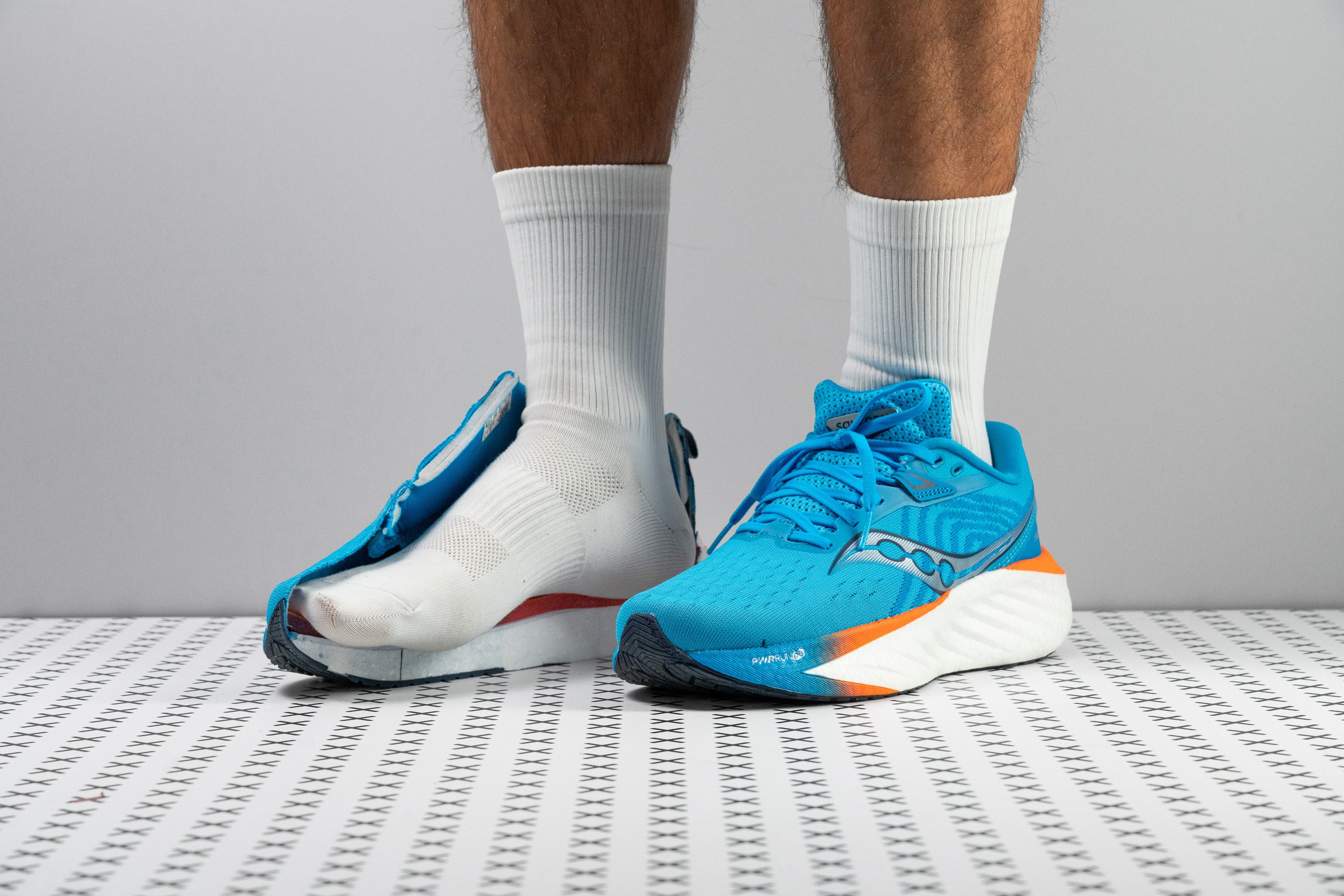Our verdict
- Top pick in most comfortable running shoes (2024)
- Top pick in best running shoes for shin splints (2025)
Pros
- Premium cozy upper
- Excels at easy or moderate long runs
- Roomy toebox
- Solid durability
- Great for heel strikers
- Tons of cushioning
- Fairly priced for its features
Cons
- A bit clunky
- Lacks breathability
- Increased stiffness
Audience verdict
- Top 25% most popular running shoes
Comparison
The most similar running shoes compared
+ + Add a shoe | |||||
|---|---|---|---|---|---|
| Audience score | 88 Great! | 90 Superb! | 91 Superb! | 87 Great! | |
| Price | $160 | $180 | $180 | $170 | |
| Pace | Daily running | Daily running | Daily running | Daily running | |
| Shock absorption | High | Moderate | High | High | |
| Energy return | Moderate | High | Moderate | High | |
| Traction | Moderate | High | High | High | |
| Arch support | Neutral | Neutral | Neutral | Neutral | |
| Weight lab Weight brand | 10.1 oz / 286g 10.1 oz / 286g | 10.3 oz / 292g 11.4 oz / 323g | 10.3 oz / 291g 10.3 oz / 292g | 9.6 oz / 272g 9.3 oz / 263g | |
| Drop lab Drop brand | 9.7 mm 10.0 mm | 10.6 mm 10.0 mm | 9.6 mm 8.0 mm | 10.0 mm 10.0 mm | |
| Strike pattern | HeelMid/forefoot | Heel | HeelMid/forefoot | HeelMid/forefoot | |
| Size | True to size | True to size | True to size | True to size | |
| Midsole softness | Soft | Soft | Soft | Balanced | |
| Difference in midsole softness in cold | Small | Small | Big | Small | |
| Toebox durability | Good | Decent | Decent | Decent | |
| Heel padding durability | Good | Good | Decent | Good | |
| Outsole durability | Good | Good | Decent | Good | |
| Breathability | Moderate | Breathable | Moderate | Moderate | |
| Width / fit | Medium | Wide | Medium | Medium | |
| Toebox width | Medium | Wide | Medium | Medium | |
| Stiffness | Moderate | Stiff | Stiff | Stiff | |
| Torsional rigidity | Moderate | Stiff | Stiff | Moderate | |
| Heel counter stiffness | Stiff | Moderate | Moderate | Stiff | |
| Rocker | ✗ | ✗ | ✓ | ✗ | |
| Heel lab Heel brand | 38.6 mm 37.0 mm | 35.2 mm 39.0 mm | 42.9 mm 47.0 mm | 42.3 mm 37.0 mm | |
| Forefoot lab Forefoot brand | 28.9 mm 27.0 mm | 24.6 mm 29.0 mm | 33.3 mm 39.0 mm | 32.3 mm 27.0 mm | |
| Widths available | NormalWide | Normal | Normal | NormalWide | |
| Orthotic friendly | ✓ | ✓ | ✓ | ✓ | |
| Season | All seasons | SummerAll seasons | All seasons | All seasons | |
| Removable insole | ✓ | ✓ | ✓ | ✓ | |
| Ranking | #254 Top 38% | #52 Top 14% | #32 Top 9% | #147 Top 39% | |
| Popularity | #165 Top 25% | #199 Bottom 48% | #157 Top 41% | #73 Top 20% |
Who should buy
We believe the Saucony Triumph 22 is a standout choice for:
- Heel strikers seeking a premium, ultra-cushioned daily trainer that offers exceptional joint and muscle protection.
- Triumph enthusiasts eager for the much-anticipated midsole upgrade to PWRRUN PB—it's finally here!
- Anyone in need of a reliable and durable workhorse that excels in mileage without compromising on comfort.
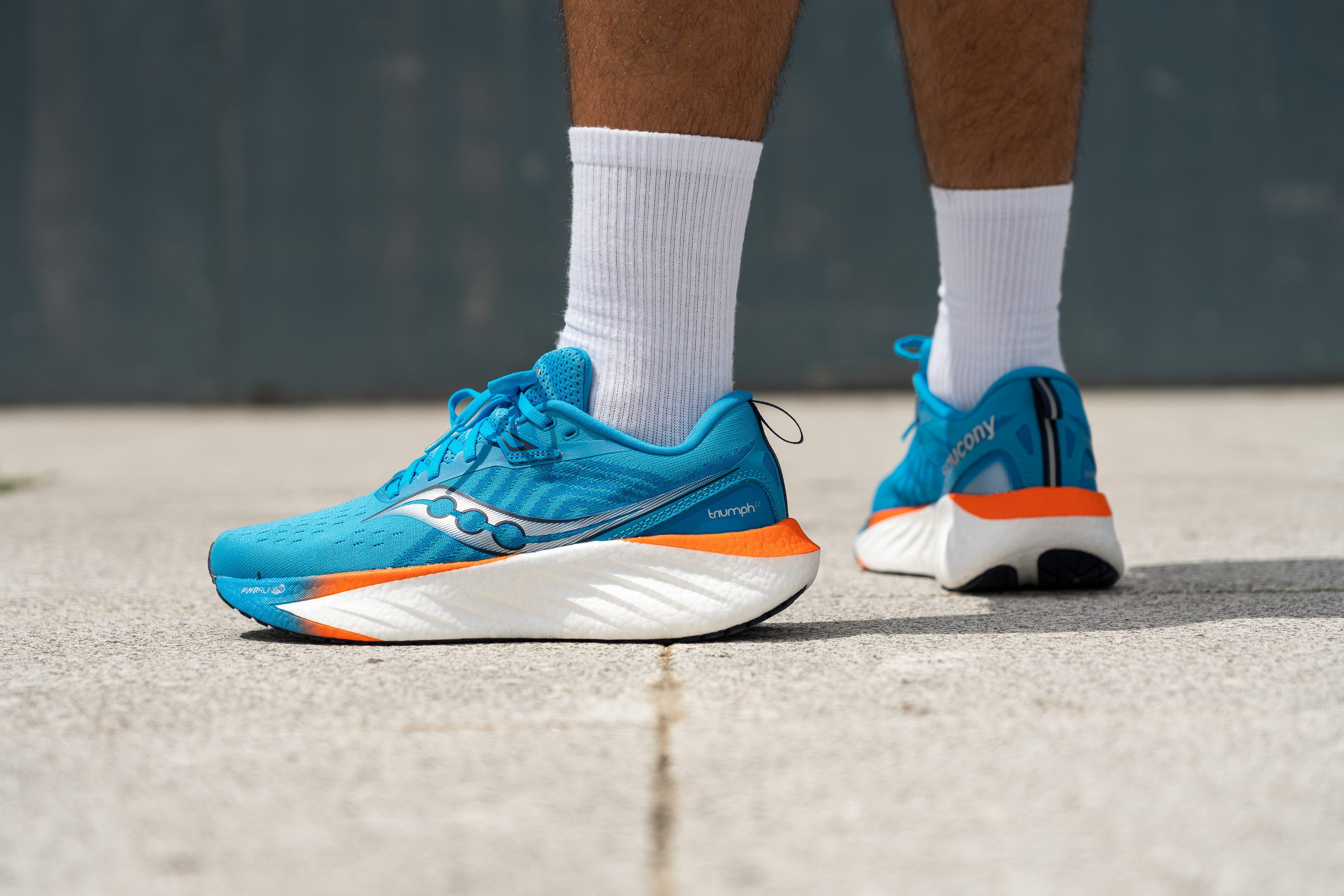
Who should NOT buy
We believe the Saucony Triumph 22, despite its impressive PWRRUN PB midsole, falls short at faster paces due to its size and geometry—particularly lacking in marathon-paced long runs. For those seeking ultimate energy return in a daily trainer, we recommend considering the ASICS Superblast or the Hoka Mach X instead.
Additionally, we've noted that some may find the Triumph's weight a bit cumbersome. If an agile ride is what you're after, we suggest exploring the ASICS Novablast 4 or the Hoka Mach 6, which also provide exceptional cushioning in a lighter package.
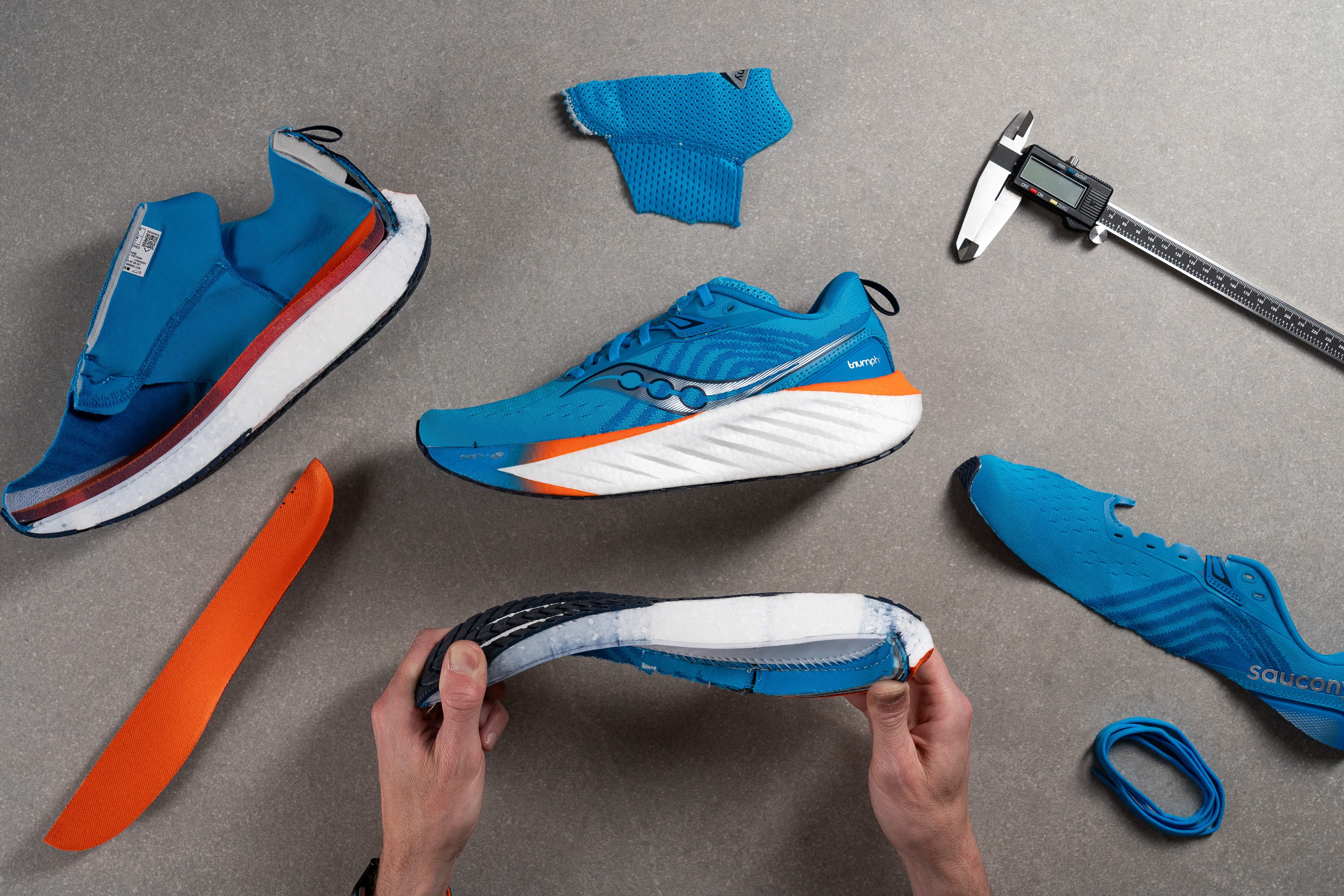
Cushioning
Shock absorption
The trend of ultra-cushioned, sky-high shoes isn’t slowing down, with brands releasing mega-stacked models like the Nike Pegasus Premium. Meanwhile, Saucony plays it safer, delivering standout cushioning in the Triumph 22 at 140 SA, yet stopping short of all-out maximalism.
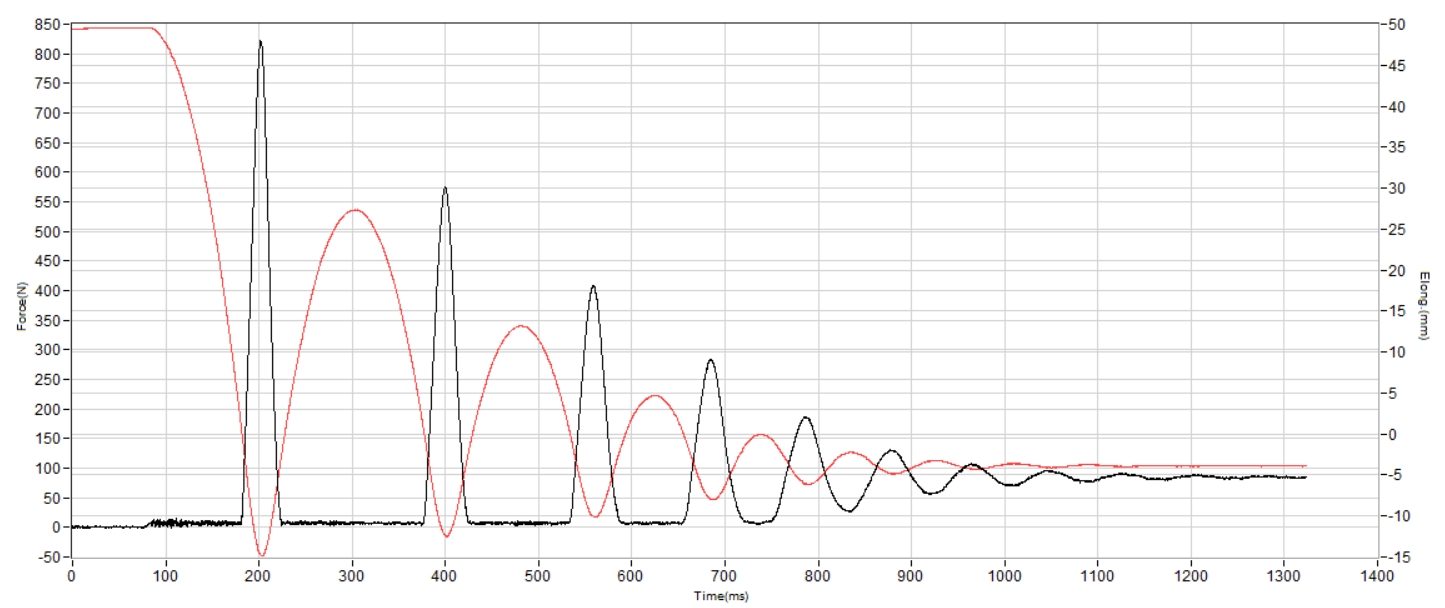
| Triumph 22 | 140 SA |
| Average | 130 SA |
Energy return
Energy return is good, but it falls short of what we expected from a shoe with PWRRUN PB. It’s clear that Saucony toned down this foam to favor stability and durability instead, resulting in a modest 60.9% energy return.
| Triumph 22 | 60.9% |
| Average | 58.6% |
Heel stack
We've used the term "maximalist," which is prevalent in the running shoe trends of 2024, and rightly so. The Triumph 22 boasts a substantial 38.6 mm heel height, which we found more than adequate, even for heavier runners who primarily heel strike.
It also stays just below the 40-mm threshold, and we appreciate this. We really think that the Triumph doesn't need additional foam underfoot—adding more would likely impact the shoe’s weight and stability more than necessary.
Naturally, this stack may not suit those who prefer a more grounded, close-to-the-ground feel. If that's you, we suggest the On Cloudrunner 2 instead.
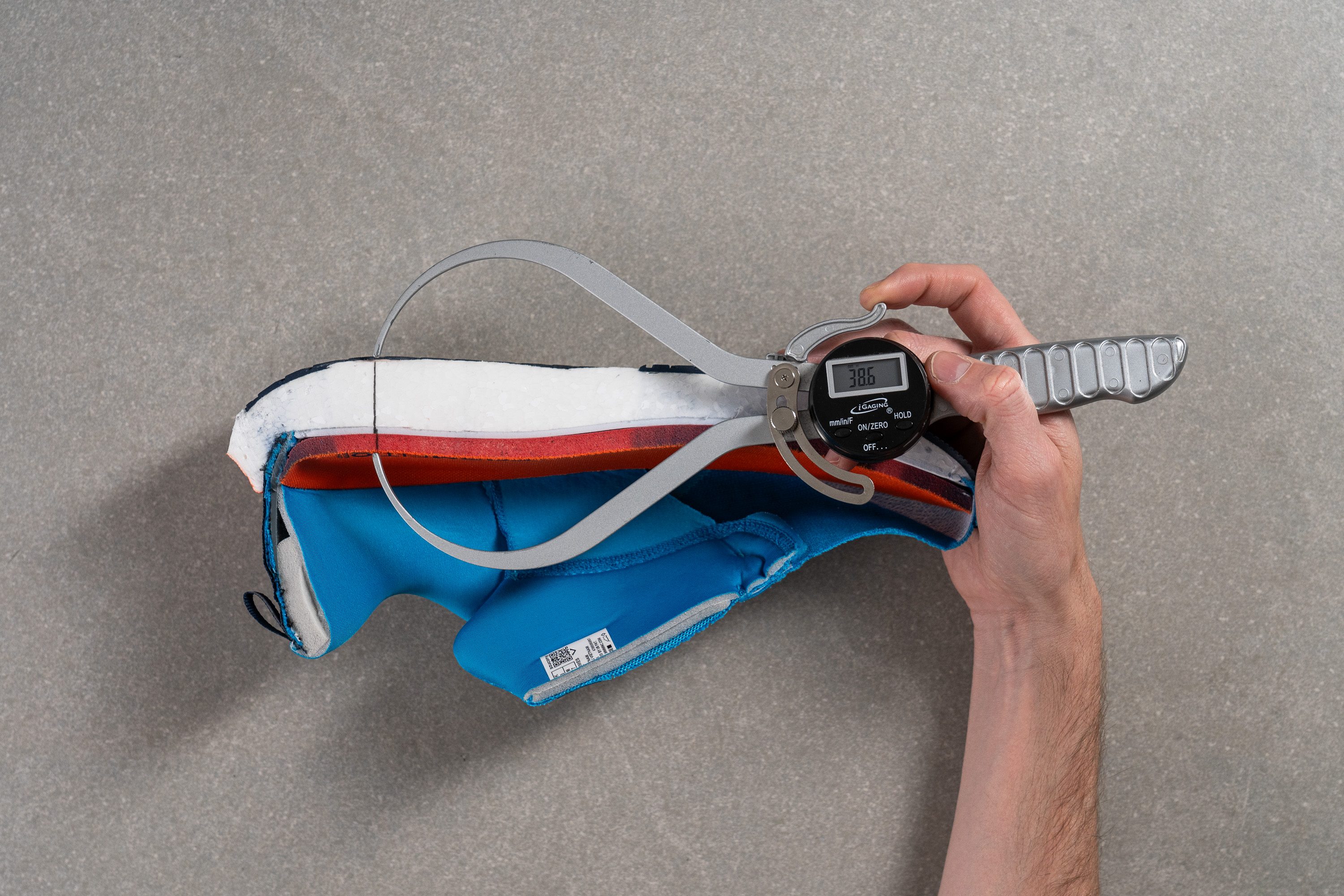
| Triumph 22 | 38.6 mm |
| Average | 34.8 mm |
Forefoot stack
The forefoot is impressively cushioned at 28.9 mm, more so than many other running shoes.
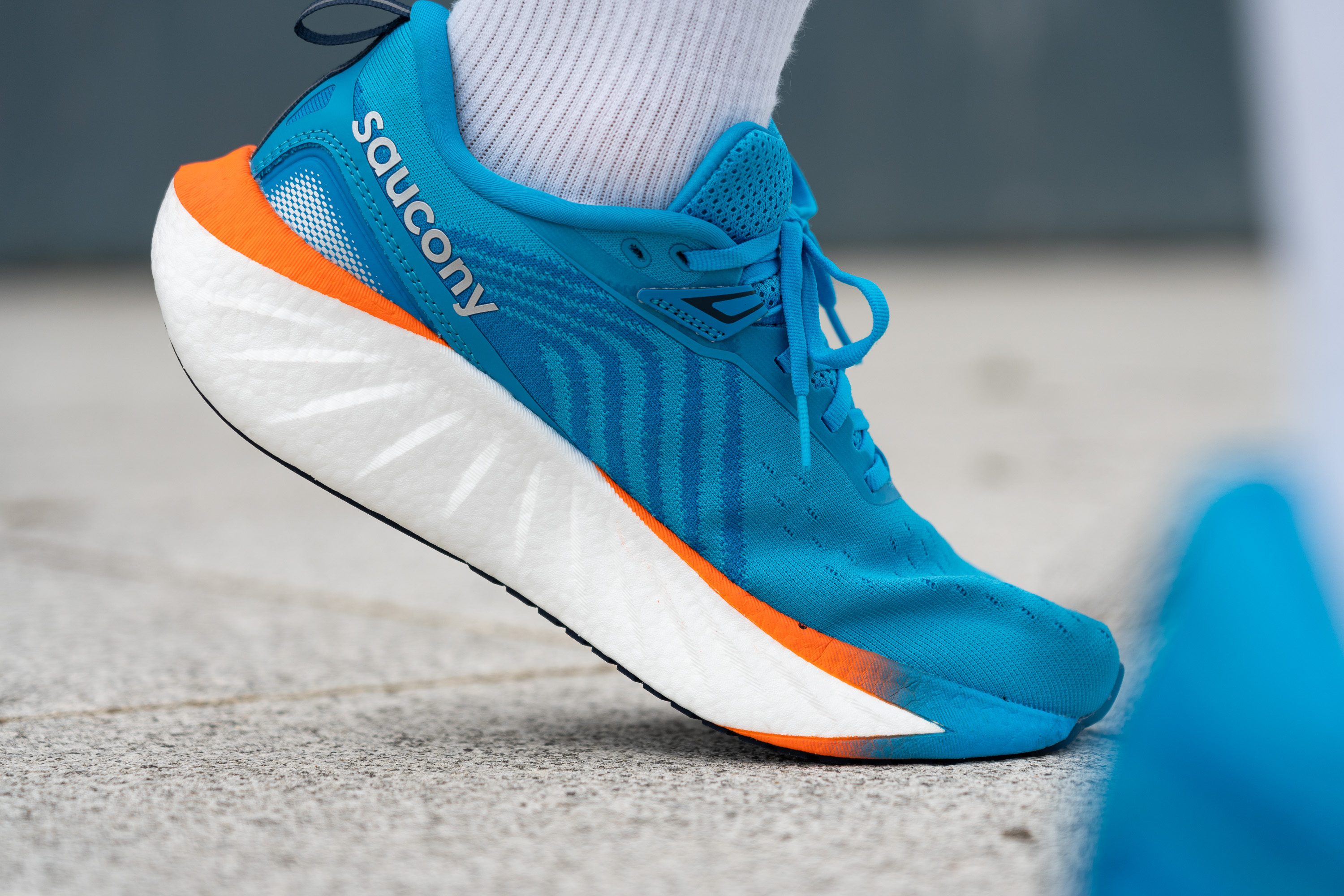
We believe this level of cushioning is perfect for long runs and suitable for nearly any runner and distance. However, if you're seeking even more cushioning in this area, you might consider the ASICS Nimbus 26, which offers an even more towering 32.0 mm of cushioning in the forefoot.
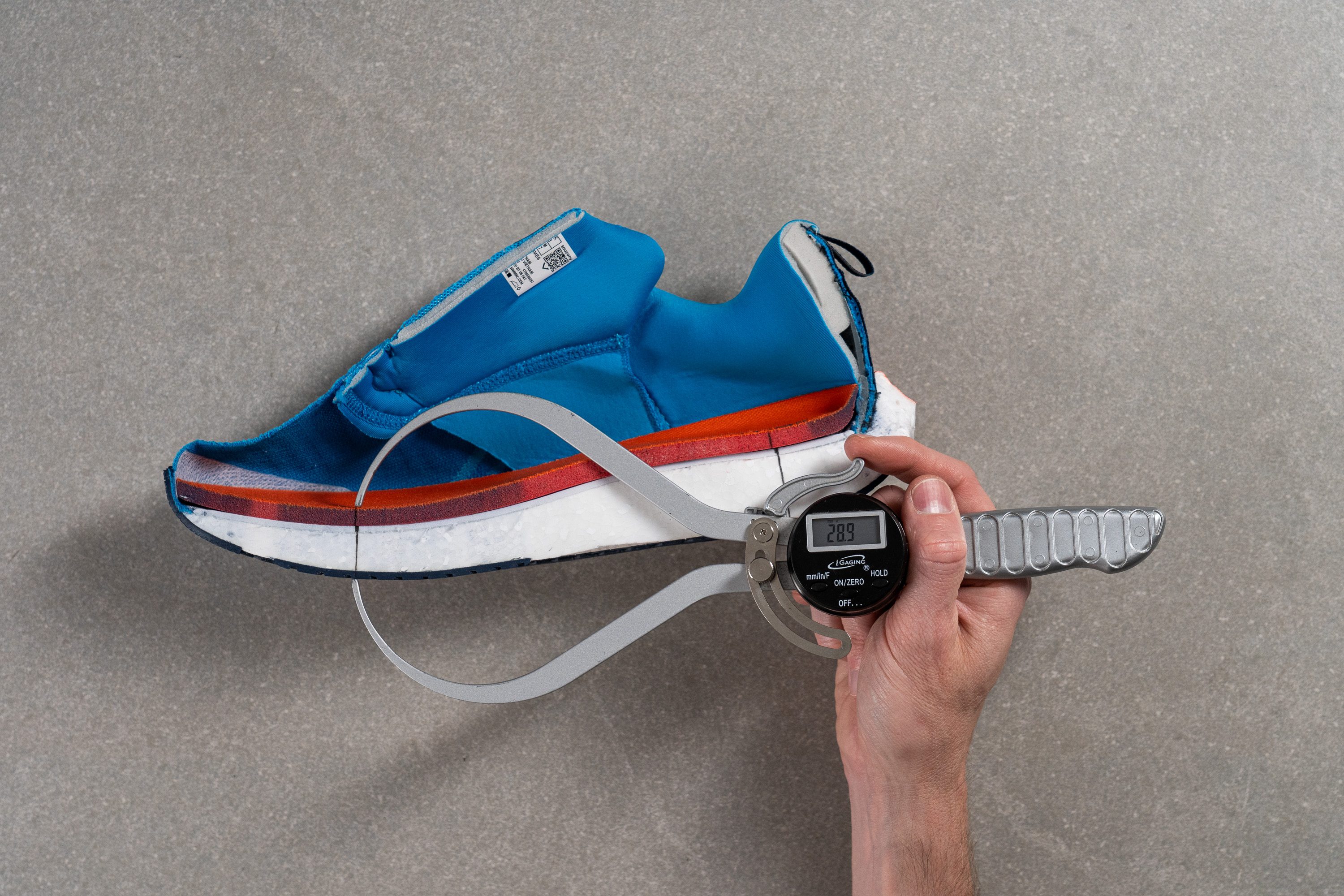
| Triumph 22 | 28.9 mm |
| Average | 26.2 mm |
Drop
Saucony advertises the Triumph 22 as having a 10-mm heel-to-toe drop, and our precise measurements in the lab (9.7 mm) almost perfectly align with these specifications.
This particular offset makes the Triumph 22 an excellent choice for heel strikers, or runners looking to relieve some stress from their calves and Achilles tendons. Nevertheless, it’s also a sure bet for forefoot and particularly midfoot strikers.
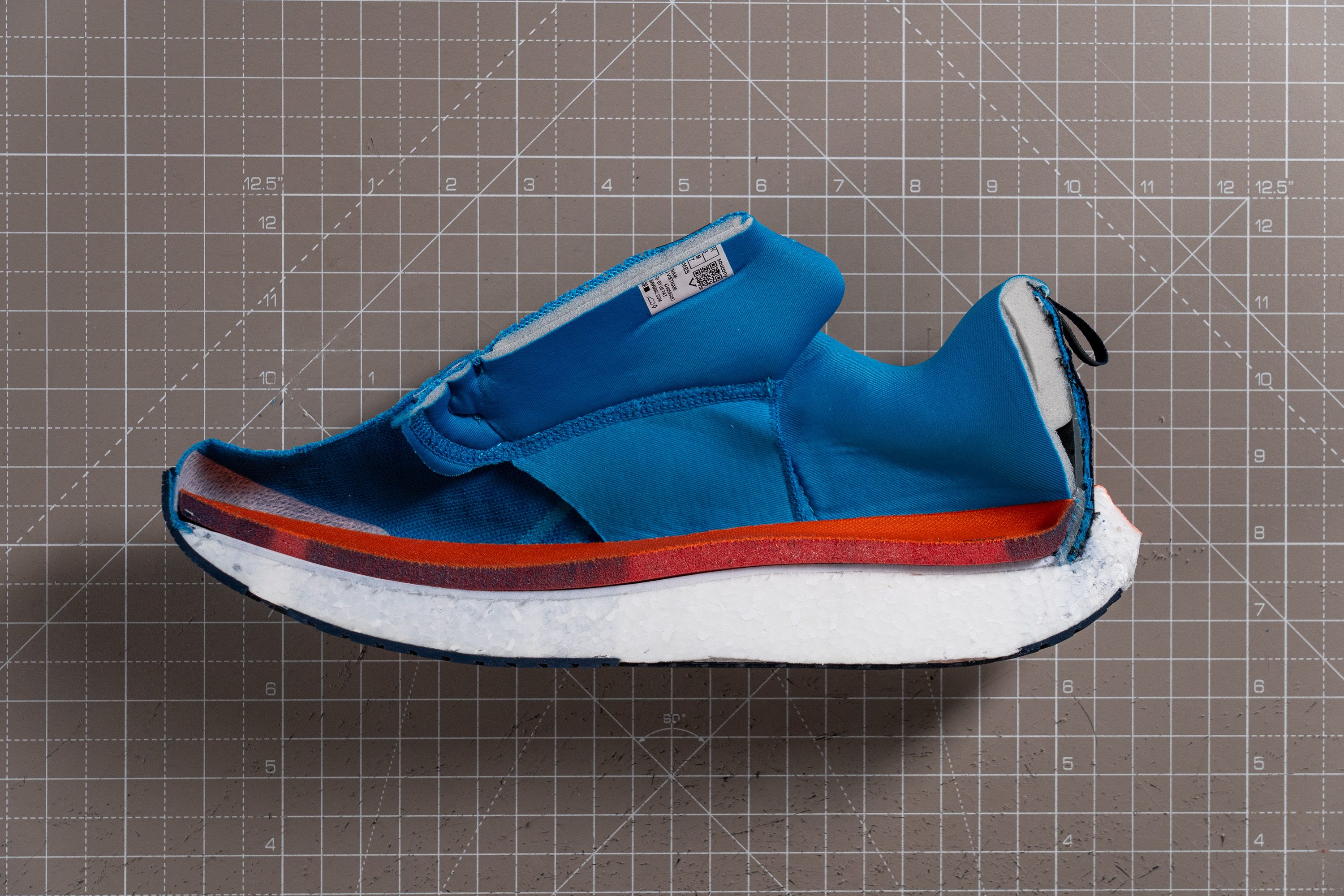
| Triumph 22 | 9.7 mm |
| Average | 8.6 mm |
Midsole softness
NewSince we first tested the Pebax-based, bouncy PWRRUN PB foam in Saucony's fastest shoes from the Endorphin lineup—like the Speed 4—we've eagerly awaited its introduction into the Triumph series. This foam is so superior to PWRRUN and PWRRUN+ that we've been highly desiring this upgrade.
We're happy to tell you that the Triumph 22 features a full-length PWRRUN PB midsole, and it doesn't include any lower-cost or EVA midsoles beneath it, unlike what other brands typically do. It's definitely one of the biggest upgrades ever in a Triumph.
We've found that it delivers a balanced ride at 41.7 AC, yet it consistently returns more energy with every stride compared to previous Triumph models.
Combined with the leg-saving qualities of Pebax-based foams, the Triumph 22 excels as an excellent choice for slow to moderate-paced long runs.
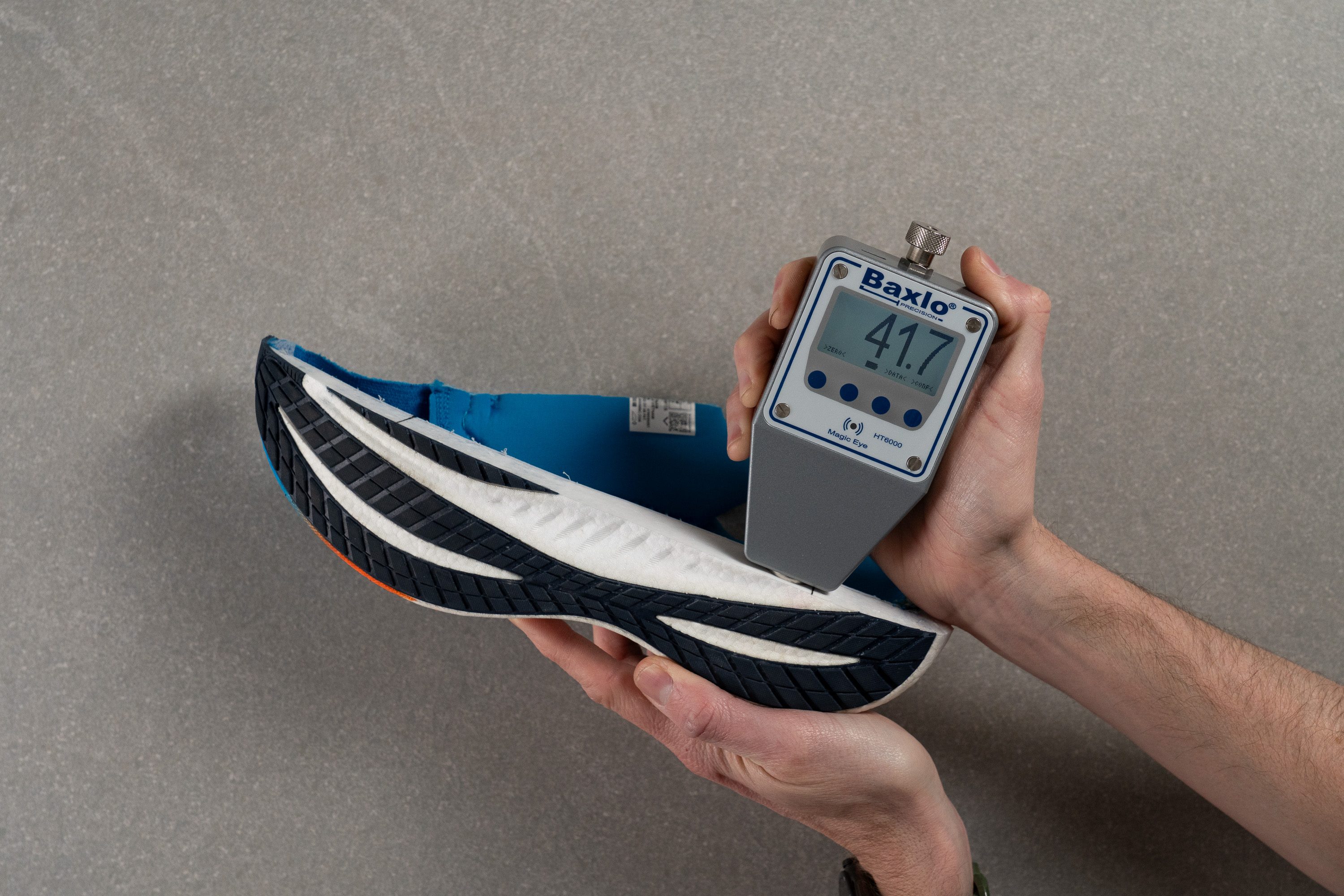
| Triumph 22 | 41.7 AC |
| Average | 36.2 AC |
Rocker
Over the last two years, we've observed in our lab that many brands have embraced rockered running shoes. However, a classic, natural daily trainer still holds appeal for most easy runs, as it helps to develop foot strength.
We discovered that Saucony struck a balance with the Triumph 22. The forefoot rocker is subtle, while the heel features a significant bevel—a smart design for easing transitions for heel strikers, given the thick midsole. Yet overall, we believe you can expect a fairly classic ride.
Size and fit
Size
Saucony Triumph 22 fits true to size (66 votes).
Internal length
| Triumph 22 | 274.8 mm |
| Average | 269.4 mm |
Width / Fit
Previous editions of the Triumph provided substantial internal space, accommodating wider feet even in the standard width. The 22nd edition continues this tradition.
Based on our findings, the shoe measures a spacious 97.5 mm in the standard width D that we bought and tested—great news for runners with wide feet or those who enjoy a roomy design. Additionally, Saucony offers a wide size for this model in select markets.
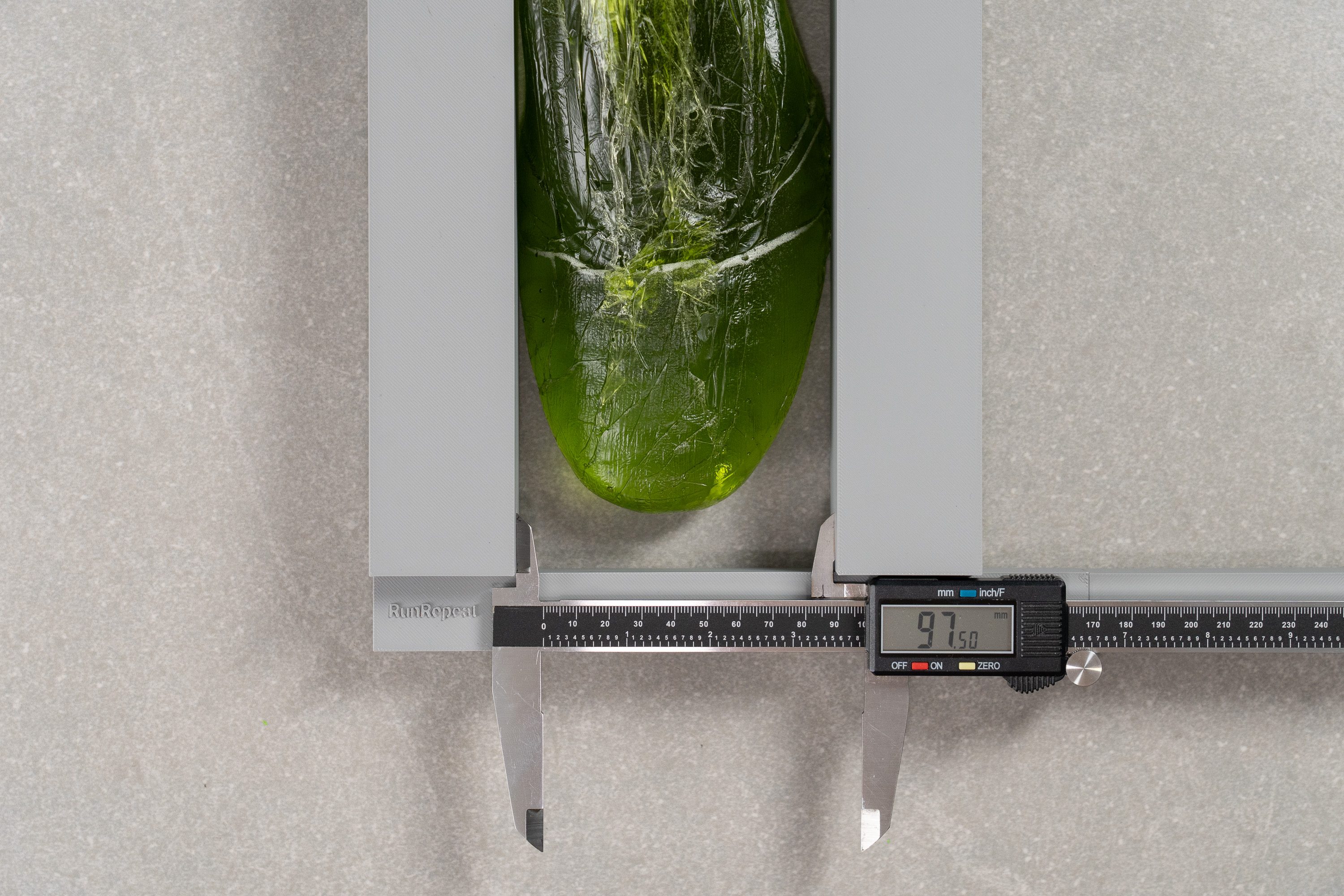
| Triumph 22 | 97.5 mm |
| Average | 95.1 mm |
Toebox width
We believe that a single measurement doesn't fully capture the shoe's feel, which is why we always take another one in the big toe area. This approach is fantastic for helping us understand how the toebox tapers.
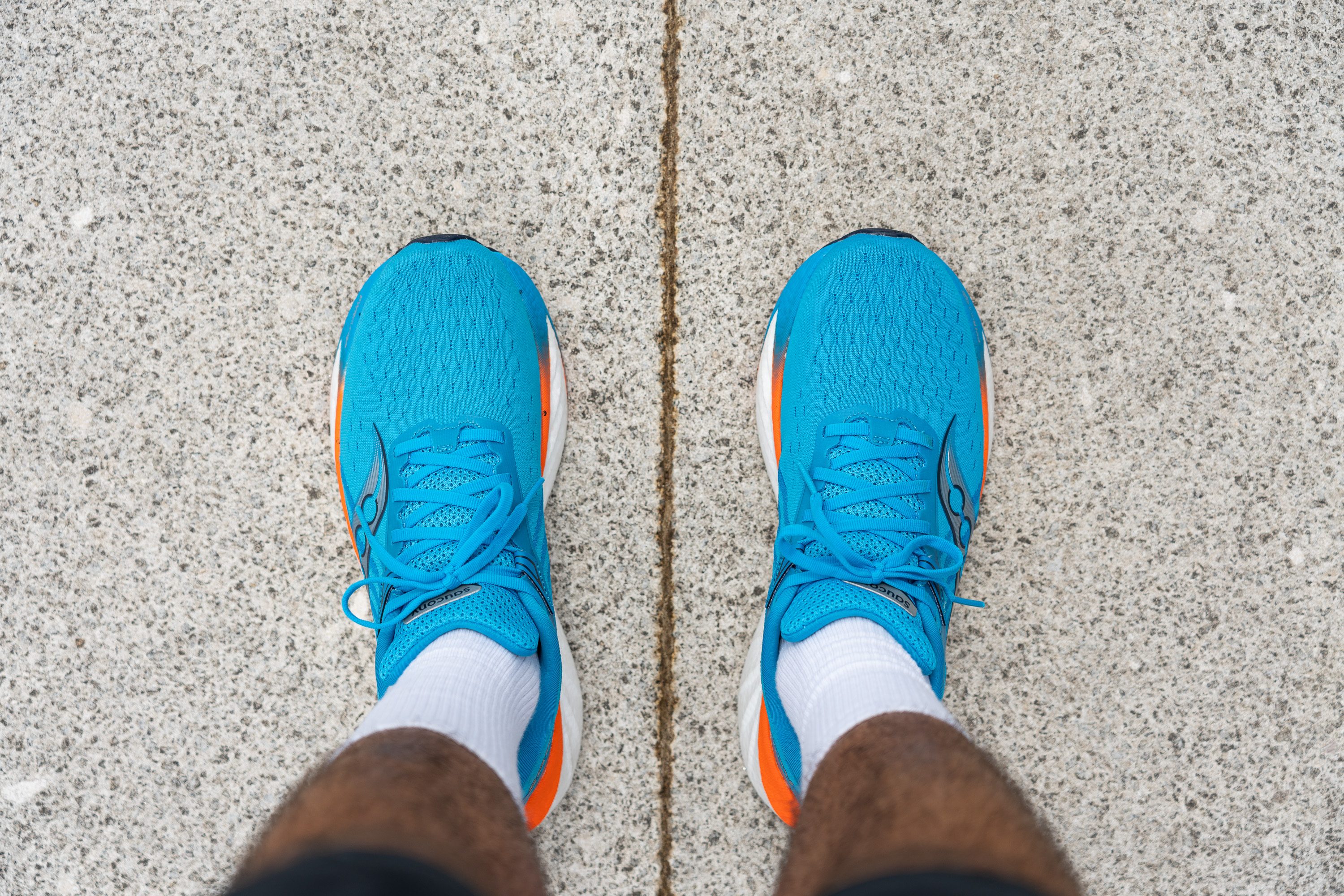
After taking this second measurement, we discovered an average design, providing a standard fit in this respect. While it's not as spacious as an Altra, it remains well-suited for most runners.
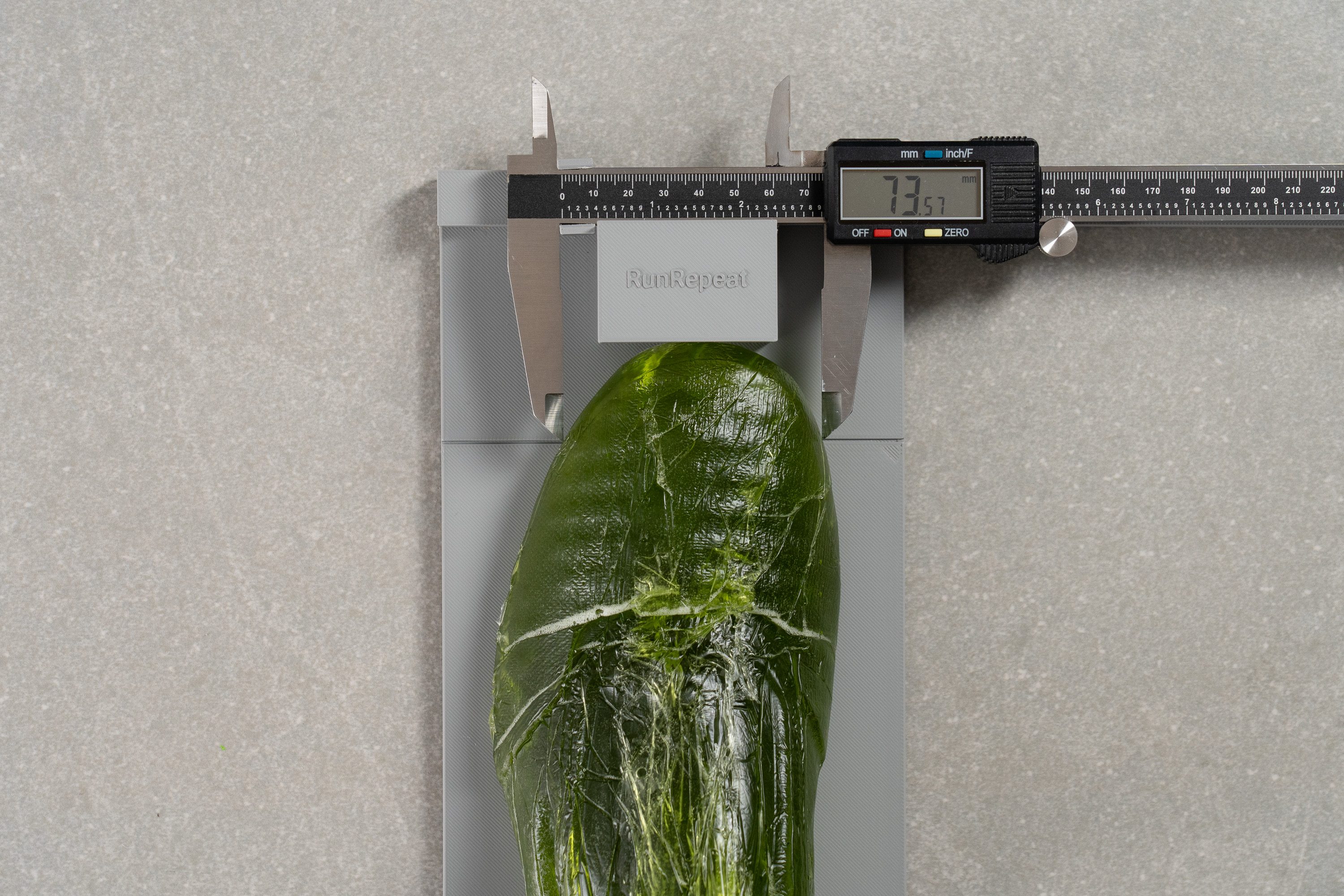
| Triumph 22 | 73.6 mm |
| Average | 73.3 mm |
Toebox height
The vertical space in the toebox should comfortably accommodate nearly everyone, as we measured 26.5 mm of height.
While a bit more room wouldn’t hurt, the upper’s stretchy design enhances comfort, and we’re convinced there’s no risk of black toenails.
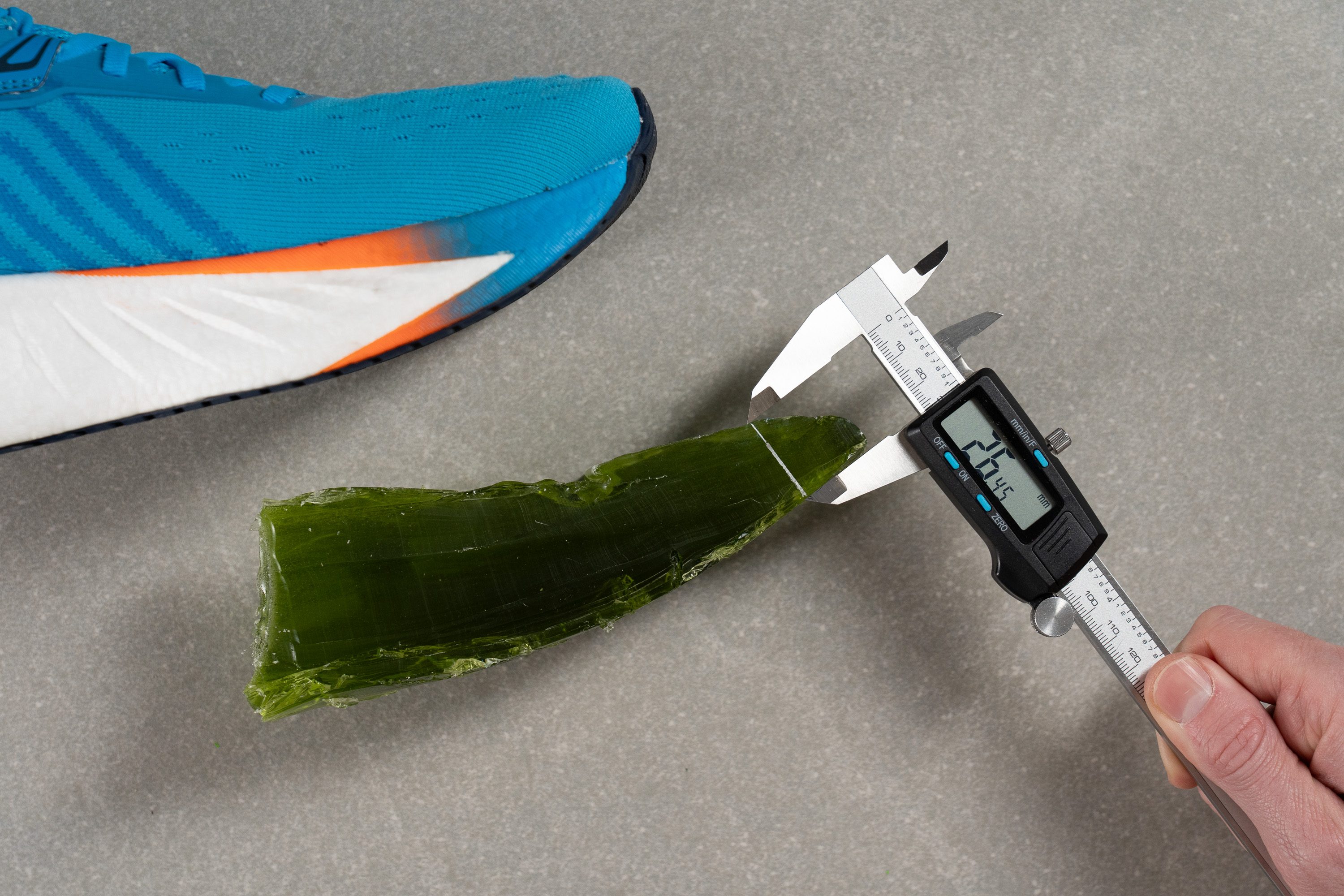
| Triumph 22 | 26.5 mm |
| Average | 27.0 mm |
Traction / Grip
Traction test
We found that the shift toward a thicker midsole and reduced rubber coverage in the Triumph 22 comes with a small tradeoff—its grip landed at 0.43 in our lab test.
That’s enough for safe traction on wet pavement and dry roads, but for a premium daily trainer, we believe a higher score is deserved—especially when other pricey Saucony models like the Endorphin Pro 4 score higher in this same test.
| Triumph 22 | 0.43 |
| Average | 0.49 |
Outsole design
We’ve got good news for anyone worried about durability—we discovered that the outsole still has solid rubber coverage. We were slightly concerned before testing the Triumph 22, especially after seeing Saucony use just a bit of rubber in models like the Endorphin Trainer, but this design keeps the Triumph on solid ground.
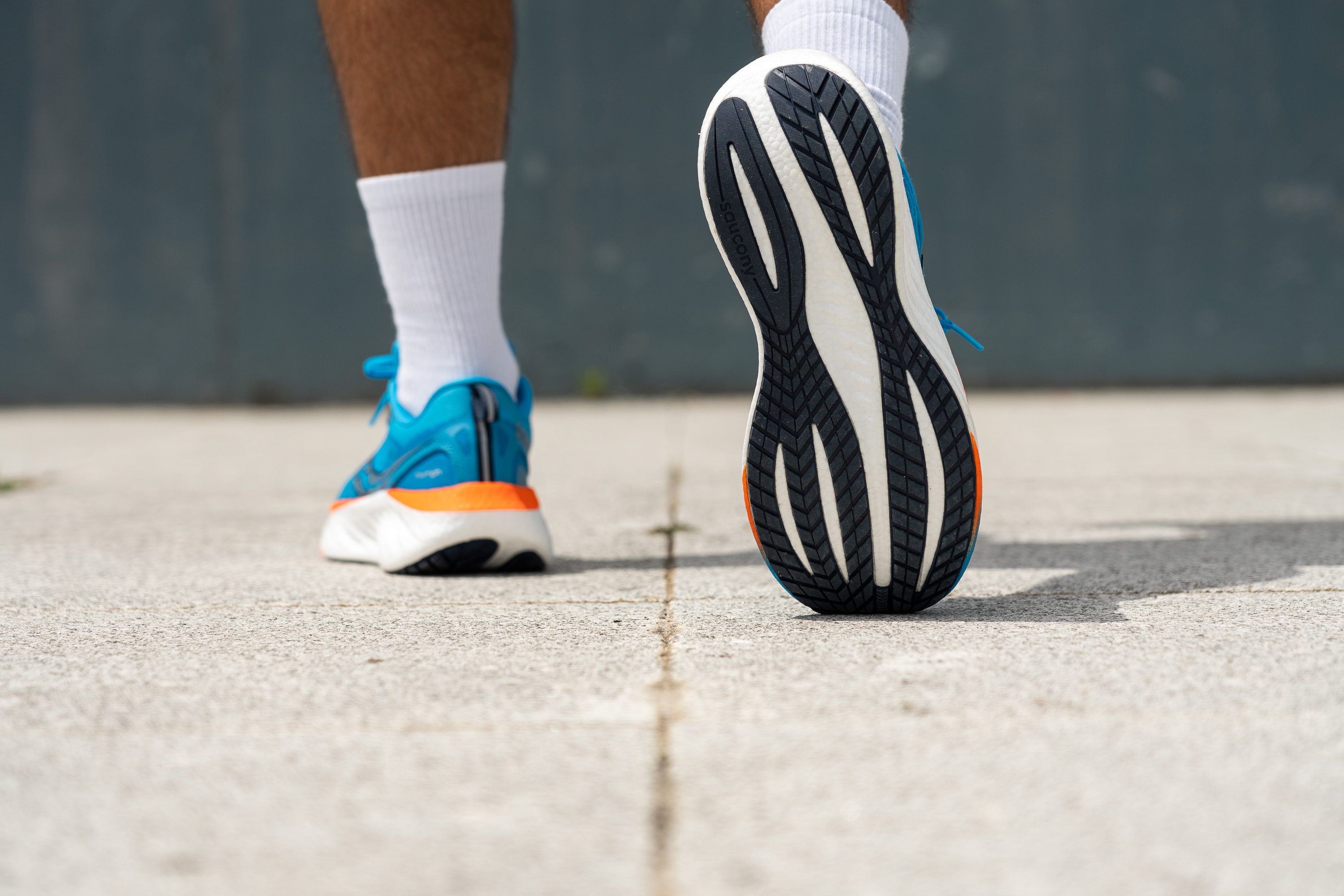
Flexibility / Stiffness
If you're looking for a cushioned-yet-versatile shoe, the Triumph still works well despite packing more foam than ever before, as it scored an average 16.1N in our 30-degree bend test.
While this may make it seem less appealing in terms of overall comfort than a super-flexible shoe, heel strikers might appreciate it—since it facilitates smoother transitions while running compared to previous models.
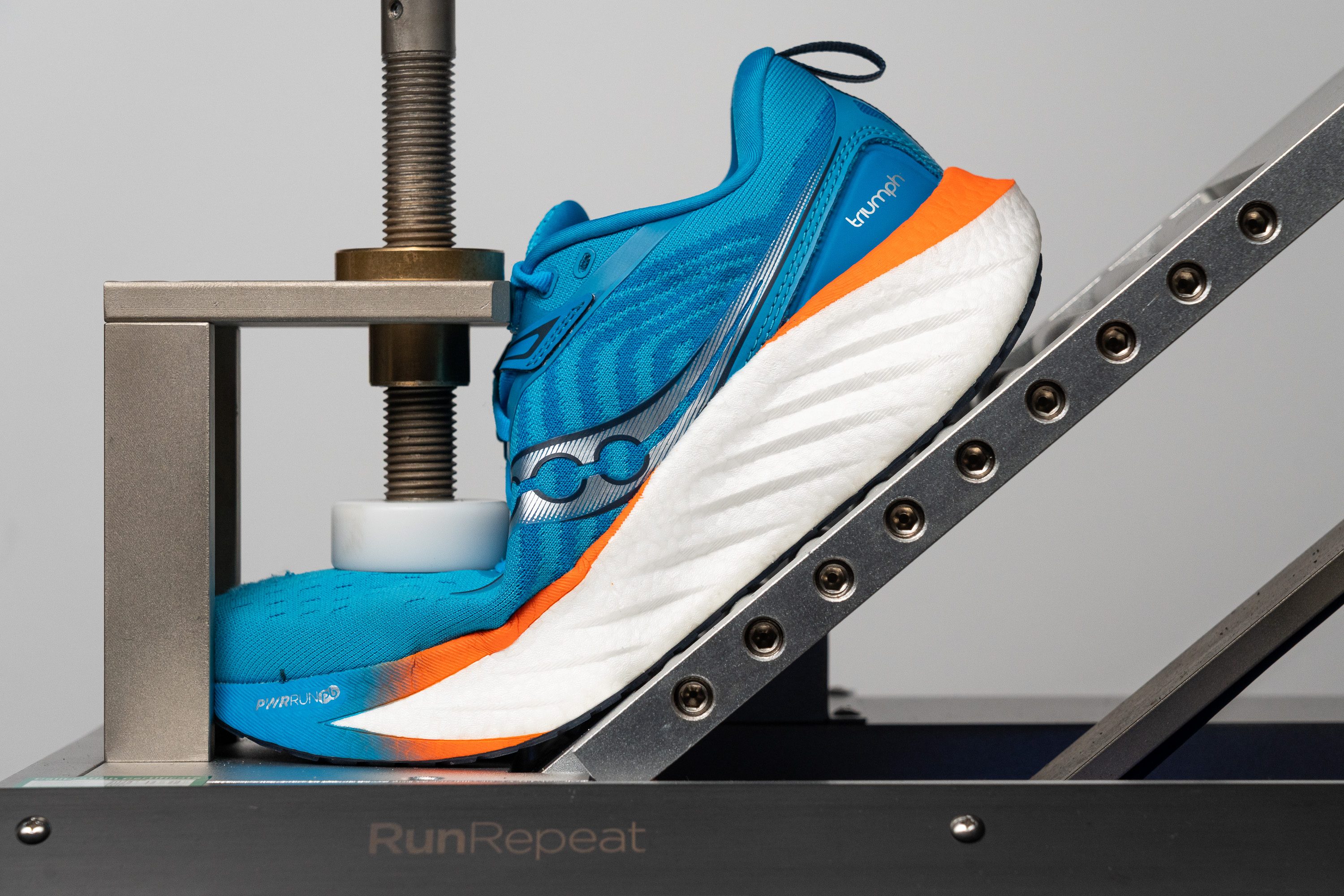
| Triumph 22 | 16.1N |
| Average | 15.3N |
Weight
Despite its dense upper and maximalist stack height, the Triumph 22 maintains a reasonable weight for its size at just 10.1 oz or 286g. It's slightly heavier than the average shoe, but it's important to remember that this is a maximalist daily trainer packed with extensive cushioning—yet it weighs almost the same as a Nike Pegasus 41.
How did Saucony achieve this? The secret lies in the PWRRUN PB midsole upgrade, an incredibly lightweight yet responsive material.
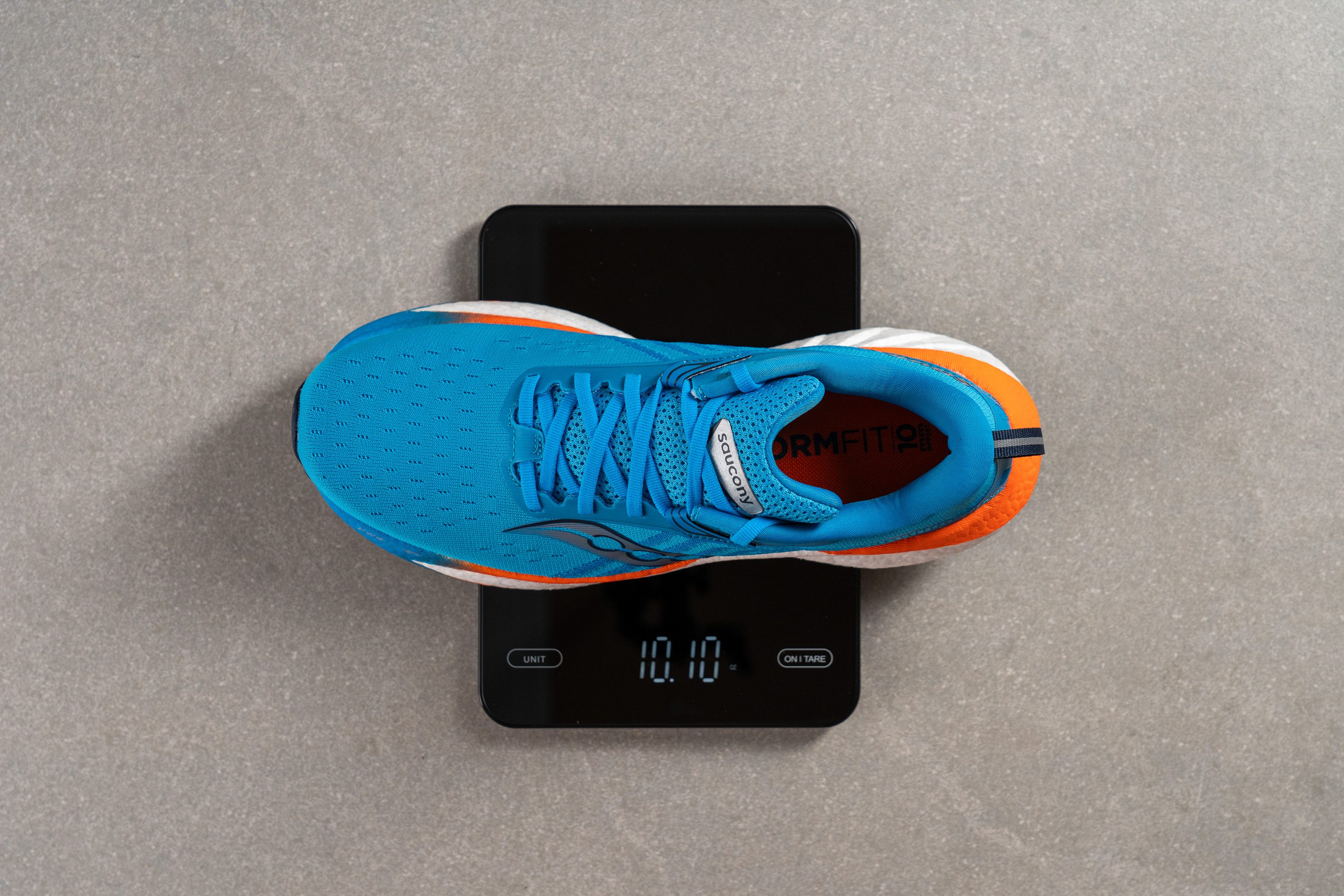
| Triumph 22 | 10.1 oz (286g) |
| Average | 9.3 oz (264g) |
Breathability
It's clear for us that Saucony wants to align this model with comfort, typically signifying a plush upper that snugly embraces your foot. We can confirm that the Triumph 22 delivers exactly that, though there is a trade-off.
A thicker upper provides a cozy lockdown but tends to restrict breathability. Thanks to our smoke-pumping machine tests, we observed this here in the lab, resulting in a 3/5 rating on our scale.
Holding the upper against a light easily reveals its potential ventilation spots, or lack thereof. Our findings convinced us that this shoe might not be ideal for intensely hot weather, as hardly any light penetrated the mesh.
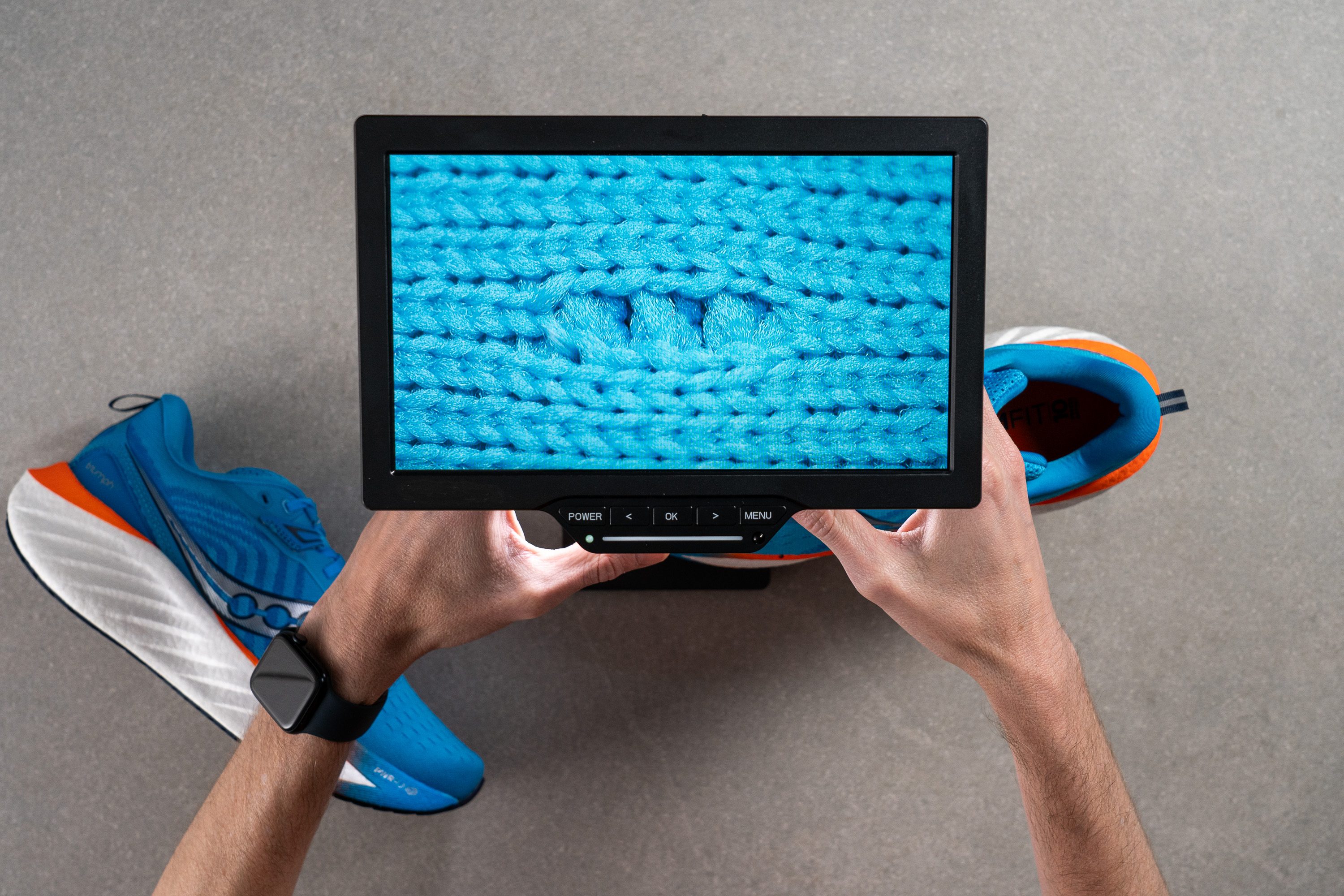
Saucony describes this upper as engineered mesh, yet in our view it's in a grey area between mesh and knit. It's undeniably a premium material that impressed us greatly, looking stunning under our microscope.
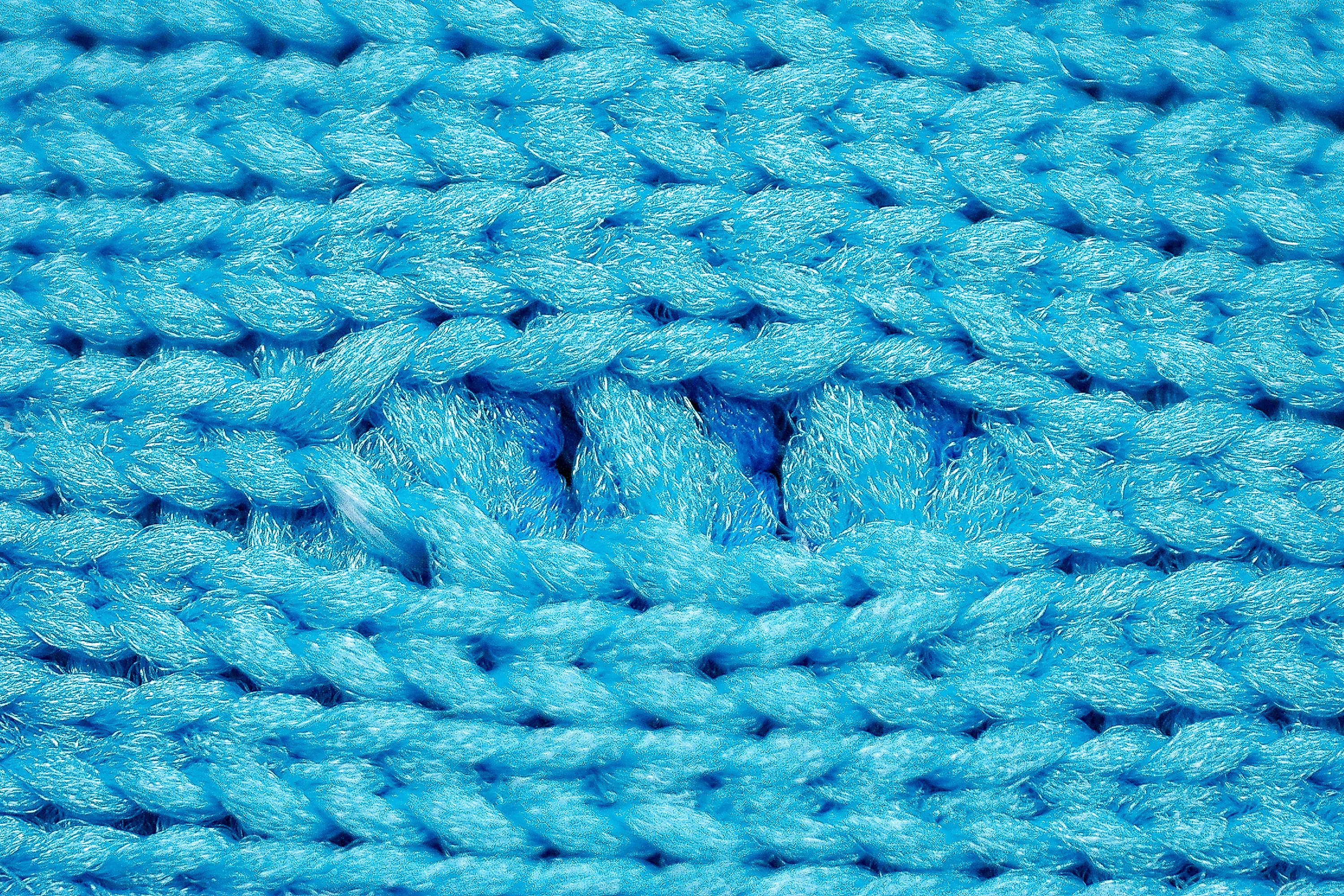
Using an augmentation tool, we also determined why airflow is poor in the Triumph 22. The upper is not only thick but also has its ventilation holes obstructed by a secondary layer.
Nevertheless, for those not planning on running in extremely hot conditions, this stretchy upper excels in terms of comfort and quality. It offers ample padding and softness throughout.
| Triumph 22 | 3 |
| Average | 3.7 |
Stability
Lateral stability test
Runners with stability needs might not find the Triumph 22 as the best option, given its neutral design. However, it incorporates some non-intrusive stability features typical of modern trainers, such as midsole sidewalls and a broader platform, particularly in the midfoot area.
For those with mild pronation, while some might manage with this shoe, we recommend choosing a model specifically designed for stability. A good alternative with similar attributes would be the Brooks Adrenaline GTS 23, which is tailored to meet such needs more effectively with its GuideRails technology.
Torsional rigidity
The outsole design of the Triumph 22 contributes to maintaining moderate torsional rigidity, despite its substantial stack height. As a result, we assigned it a middle-of-the-road score of 3 out of 5 in our manual evaluation.
This balance helps to keep the shoe stable without sacrificing too much flexibility.
| Triumph 22 | 3 |
| Average | 3.5 |
Heel counter stiffness
Saucony has continued the strategy from their previous model by using again a firm heel counter, which greatly aids in stability, especially for rearfoot strikers. As a result, we awarded it the same 4/5 rating as before.
On the negative side of things, such a firm counter might affect the comfort for those who experience irritation in the Achilles tendon.
| Triumph 22 | 4 |
| Average | 2.9 |
Midsole width - forefoot
Just like last year's model, the forefoot of the Triumph 22 is massive, resembling that of stability shoes. This year, it measures 120.1 mm, slightly larger than the 118.1 mm of the previous version.
We believe this is close to the maximum width desirable, and we hope Saucony will maintain this dimension. Any wider could potentially compromise the shoe's running experience, as it seems to be at the absolute limit now.
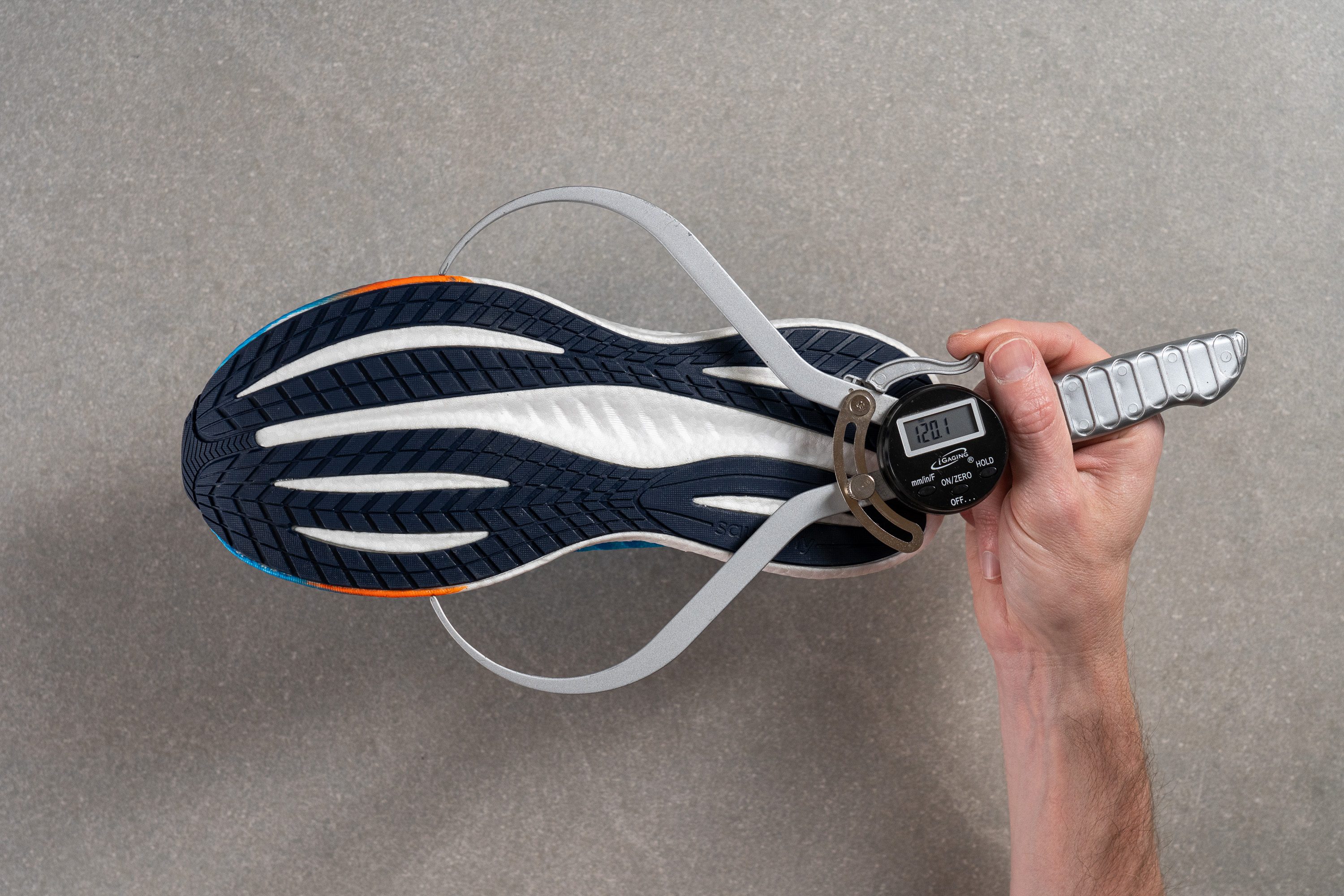
| Triumph 22 | 120.1 mm |
| Average | 114.4 mm |
Midsole width - heel
While the forefoot has seen minimal change from the last version—a mere two millimeters increase—we've observed a significant adjustment in the heel, which expanded from 91.3 mm to 98.2 mm.
This adjustment clearly targets heel strikers more than ever, aligning well with the shoe’s ample cushioning in the rearfoot and high heel-to-toe drop.
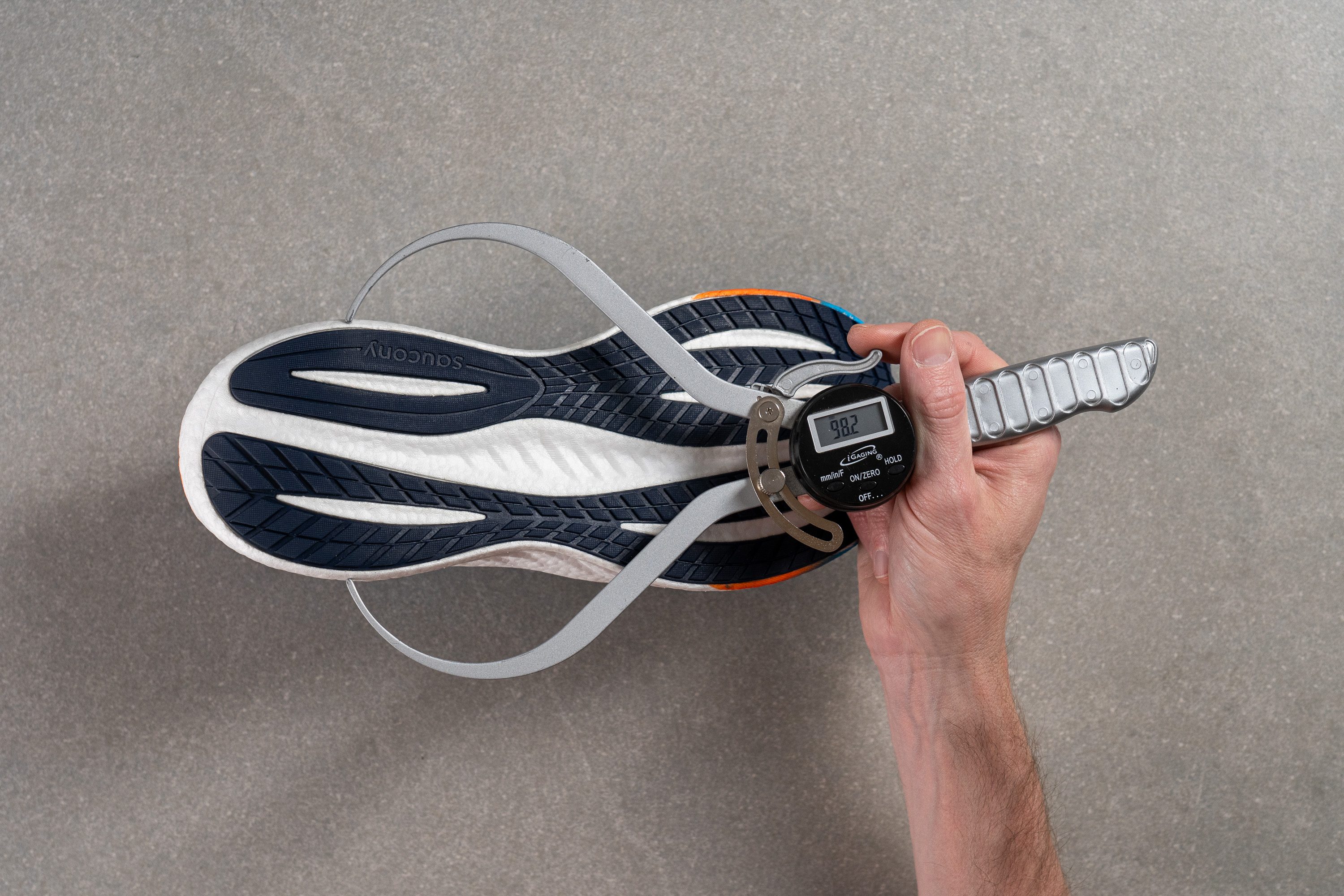
| Triumph 22 | 98.2 mm |
| Average | 90.6 mm |
Durability
Toebox durability
We previously noted that the upper delivers a premium feel, but does it also live up to that standard in terms of durability? Let’s see!
Using our Dremel at 5K RPM and 3.2N of force, we discovered that the engineered mesh performed exceptionally well with only minor damage, earning a strong 4 out of 5.
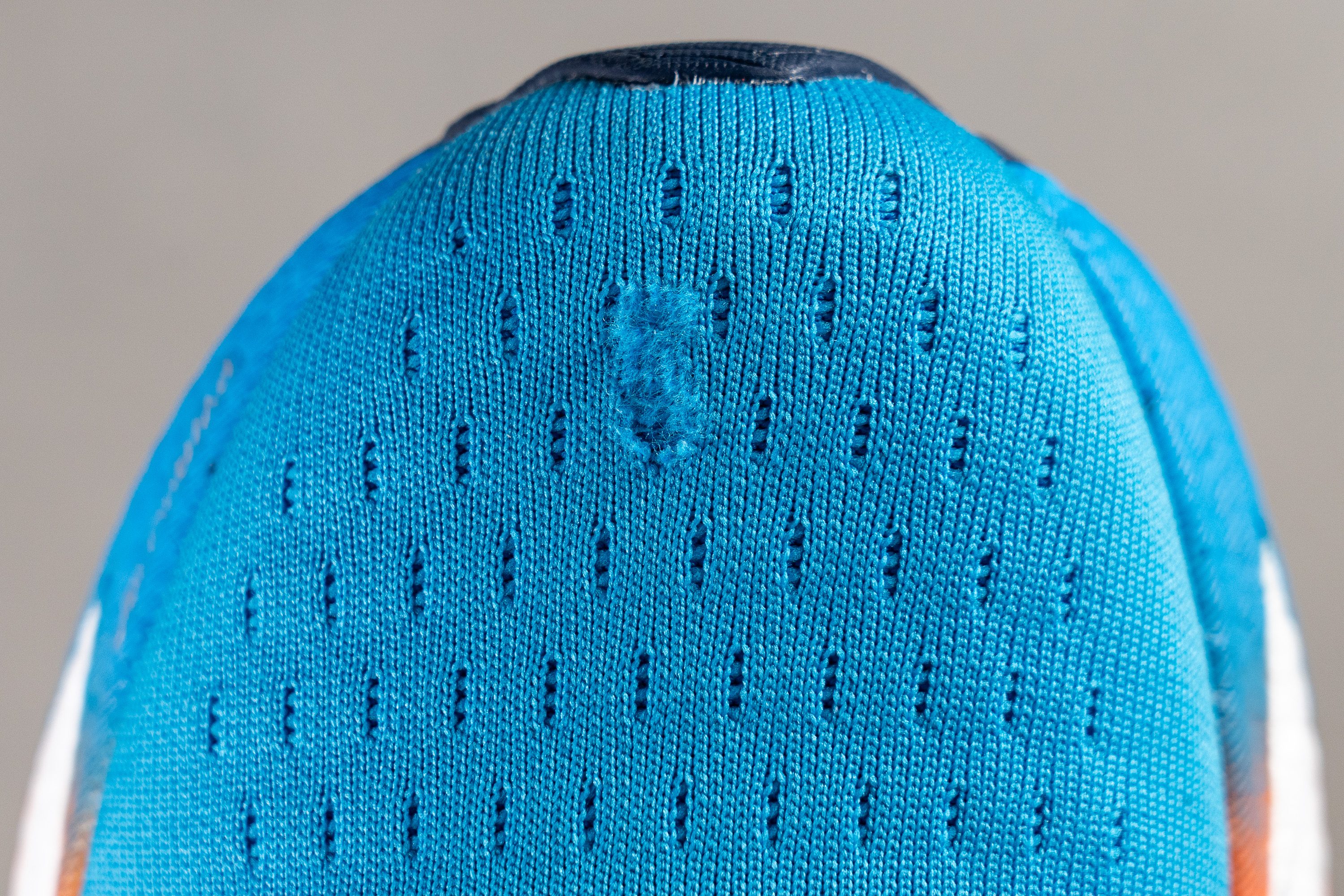
| Triumph 22 | 4 |
| Average | 2.6 |
Heel padding durability
After the Triumph 22's A-grade performance in the initial Dremel test, we were eager to see how the heel collar would stand up to our next challenge, especially since ultra-padded shoes often fail in this regard.
To our delight, we discovered that Saucony excelled with the heel—it's not only exceptionally comfortable but also built to last. We awarded it the highest possible score of 5/5.
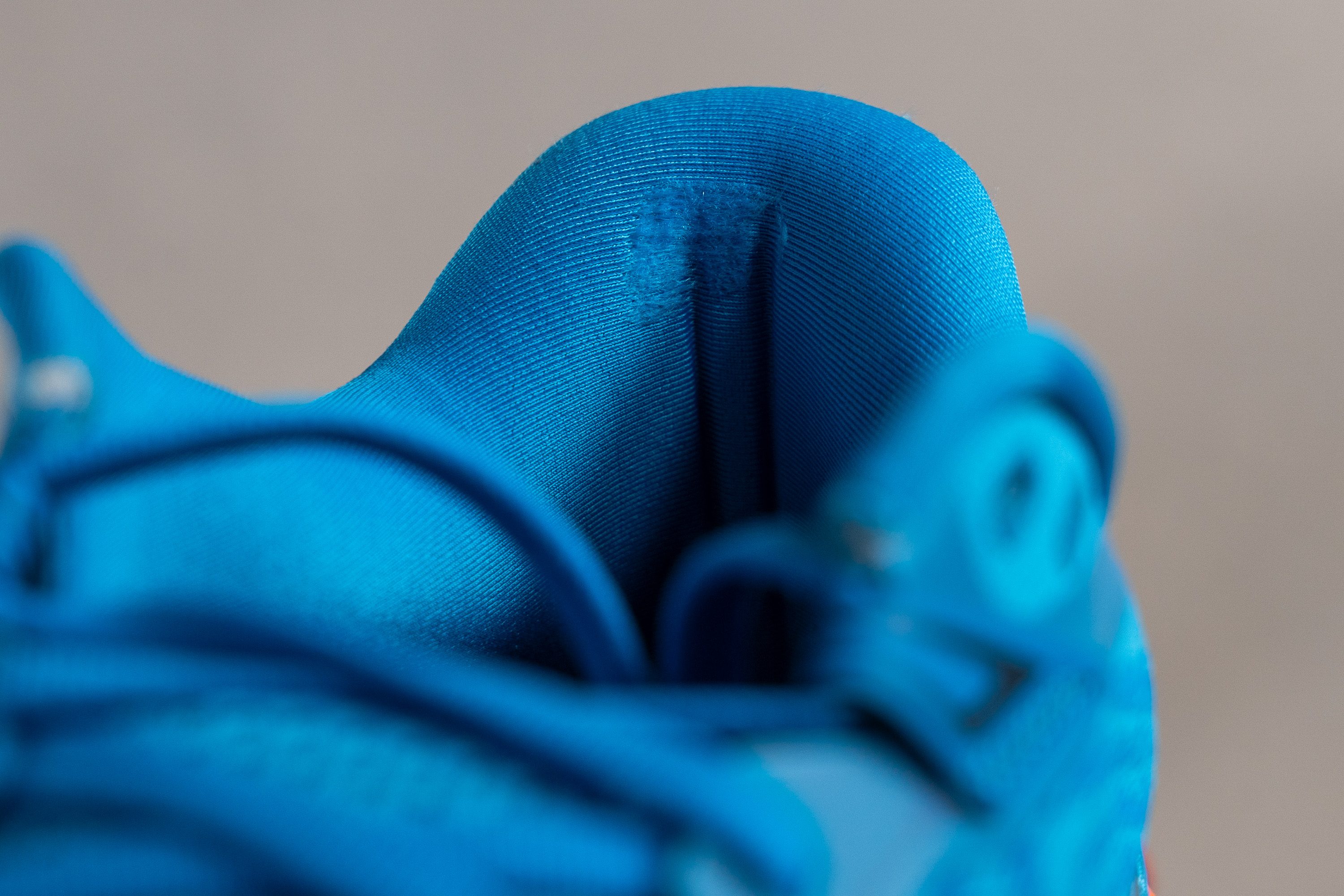
| Triumph 22 | 5 |
| Average | 3.4 |
Outsole durability
We subjected the outsole of the Triumph 22 to our final Dremel test, keen to see if it justifies the $160 price tag.
The results were reassuring. While not outstanding, a 0.9 mm indentation from this Dremel test gives us confidence that the outsole will hold up well under expected wear conditions.
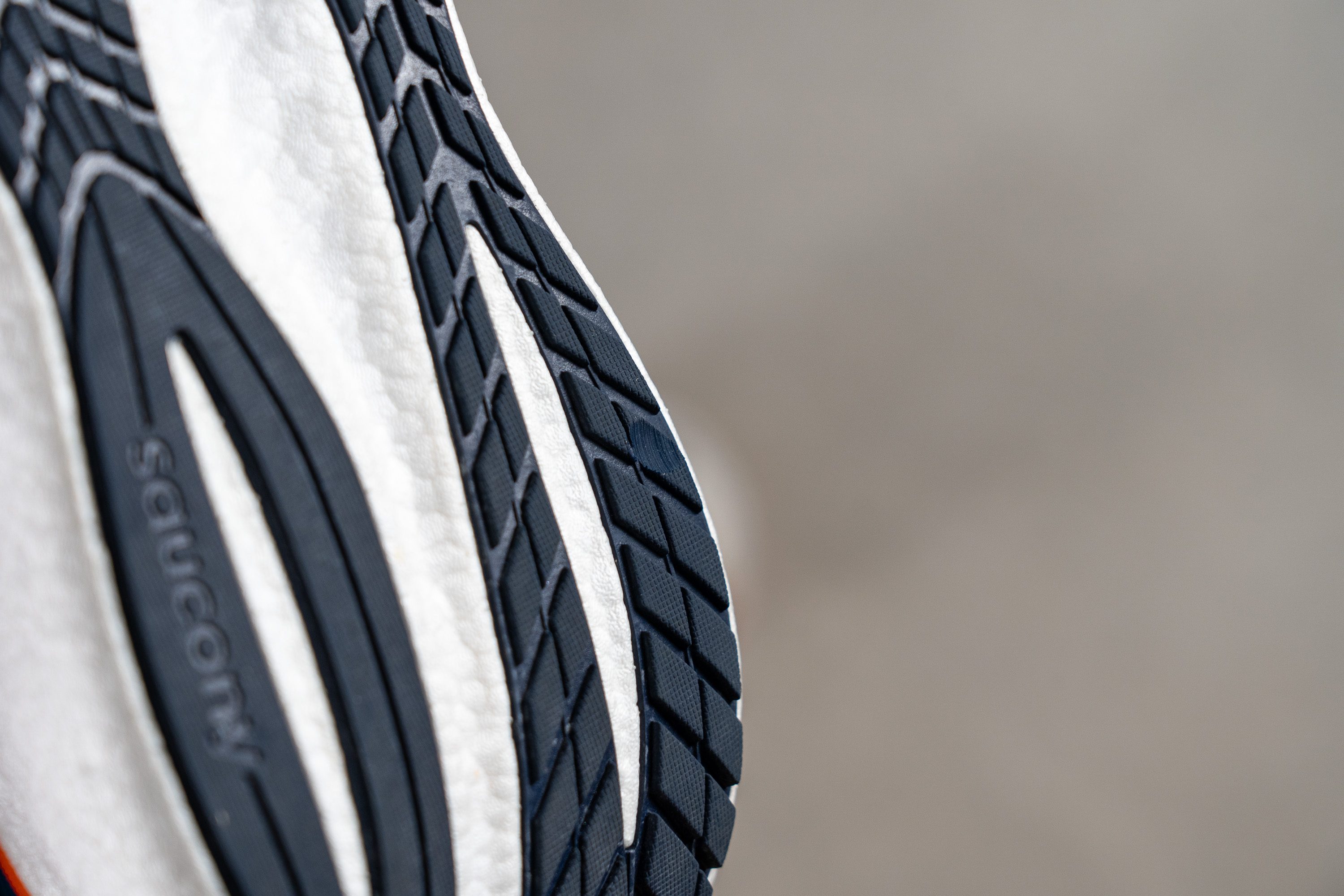
| Triumph 22 | 0.9 mm |
| Average | 1.1 mm |
Outsole thickness
To prioritize durability and protection, Saucony opted to add a bit of weight to the shoe. As a result, we found that the outsole has a substantial 3.0 mm thickness, akin to most modern daily trainers.
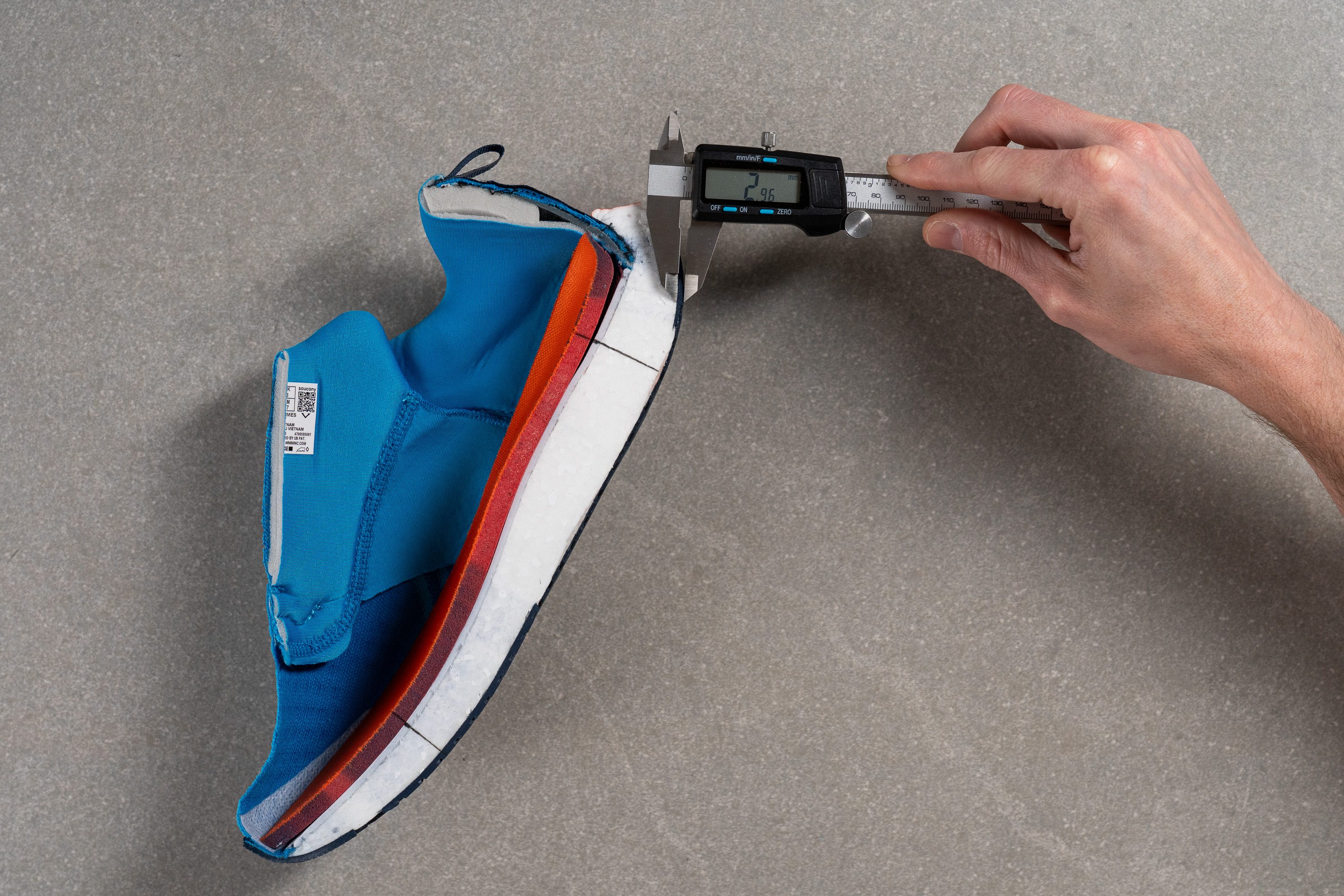
| Triumph 22 | 3.0 mm |
| Average | 3.2 mm |
Misc
Insole thickness
The FORMFIT insole of the Triumph 22 is impressively thick at 7.1 mm, enhancing the overall cushioned feel of the shoe.
However, for future versions, we suggest Saucony opting for a thinner insole paired with more foam underfoot, since the insole lacks bounce and does not contribute much to energy return.
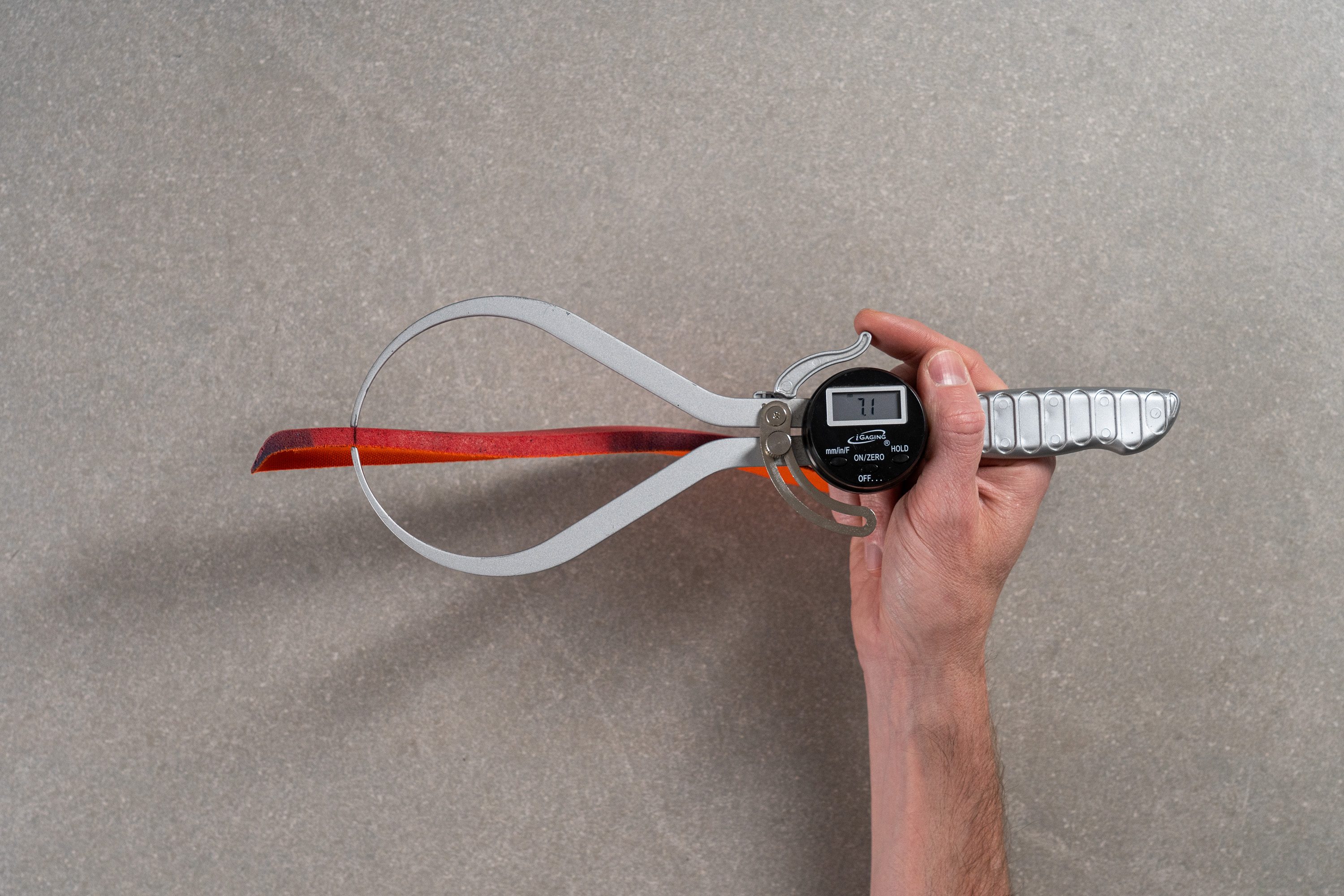
| Triumph 22 | 7.1 mm |
| Average | 4.5 mm |
Removable insole
The Triumph 22 features a massive, thick insole that is removable. Because of that, it allows for the insertion of custom orthotics and you can swap the stock footbed for a thinner one, creating more room in the toebox if needed.
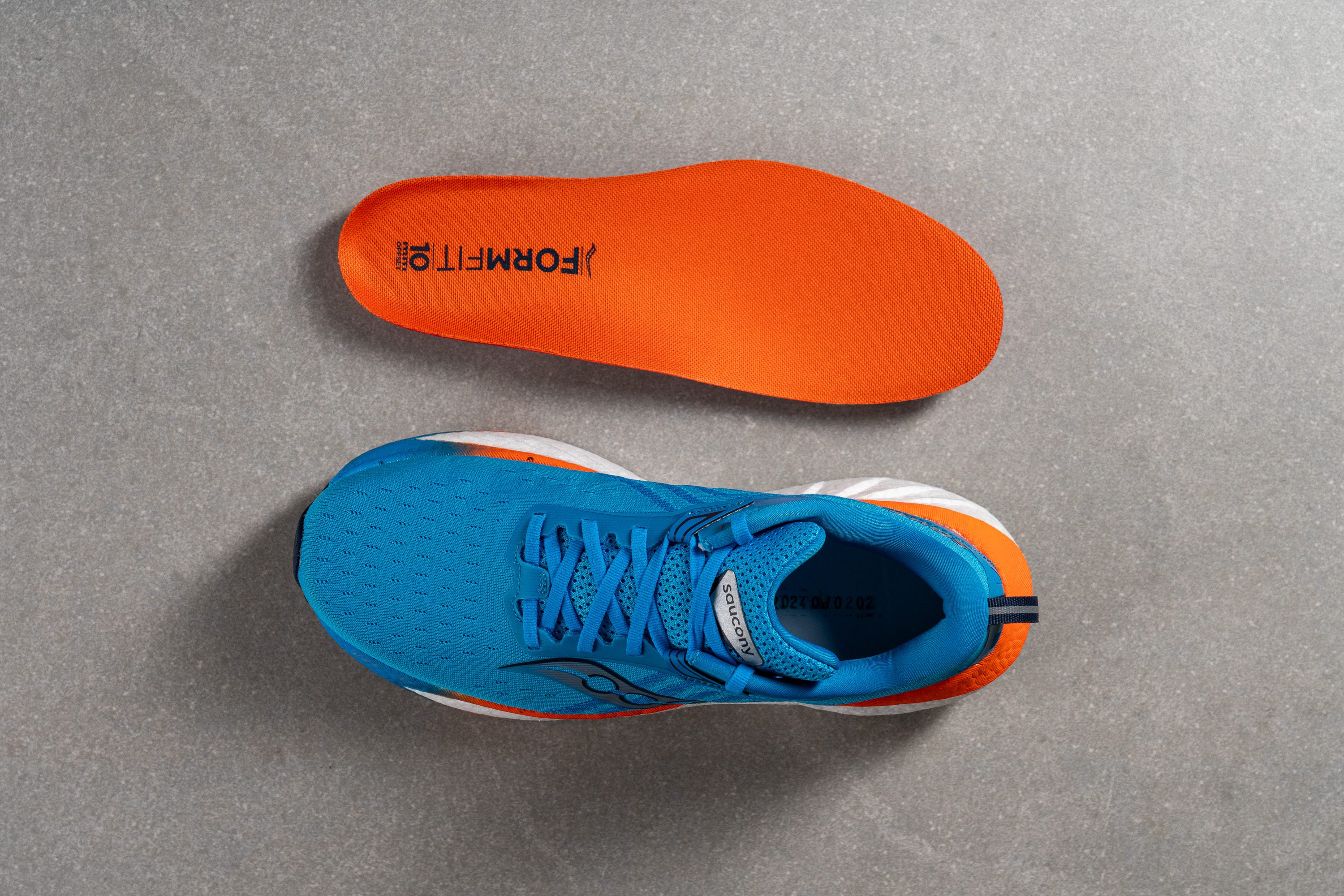
| Triumph 22 | Yes |
Midsole softness in cold (%)
Another advantage of all superfoams is their consistent performance across all temperatures. We tested this by placing the Triumph 22 in the freezer for 20 minutes and then measuring its softness. The results showed only a 19.9% variance in softness!
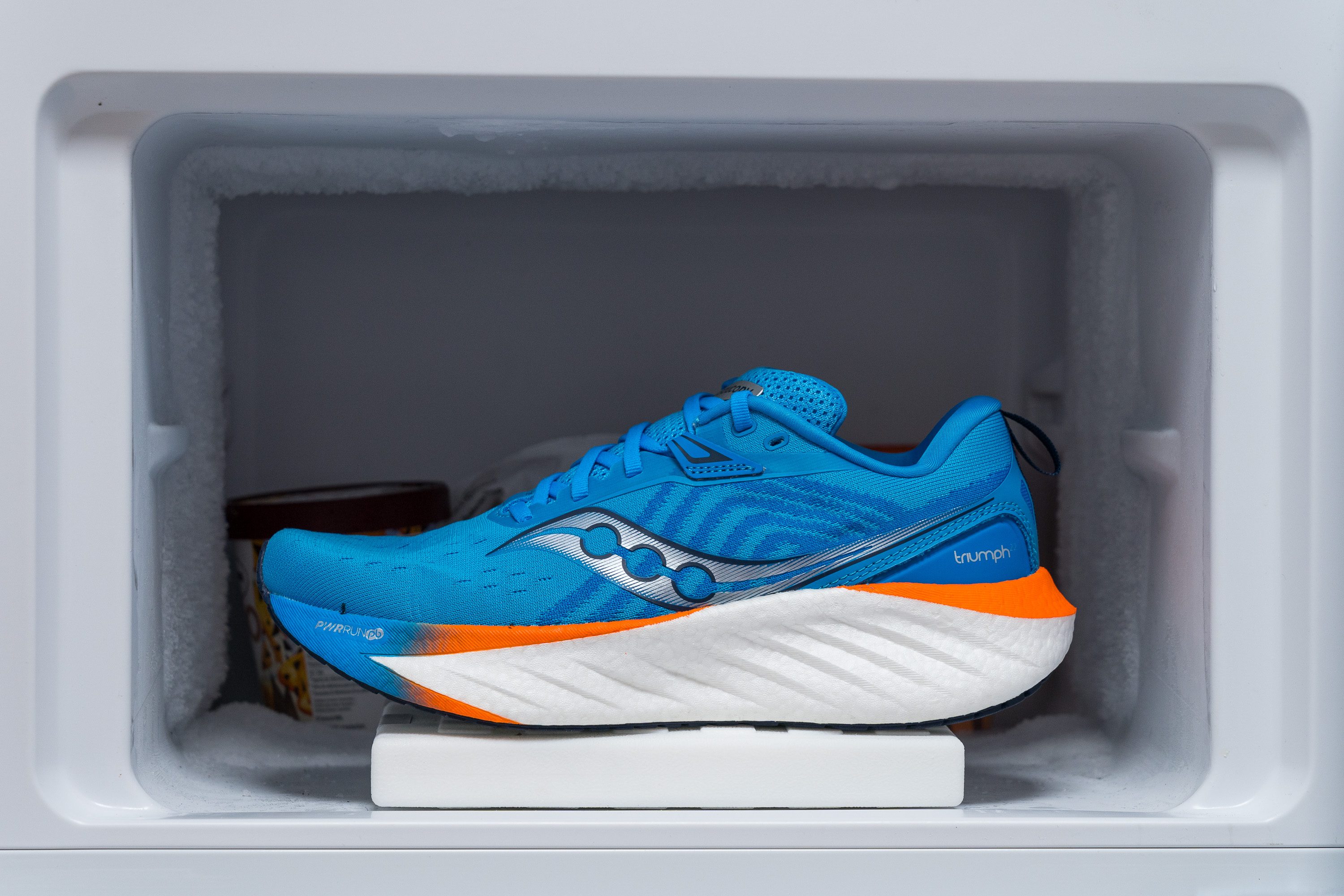
| Triumph 22 | 20% |
| Average | 24% |
Reflective elements
As a premium daily trainer, we expect some bonus features. And reflective elements are one of our favorite details. Luckily, we've observed that Saucony has cleverly included reflective strips on the heel tab.
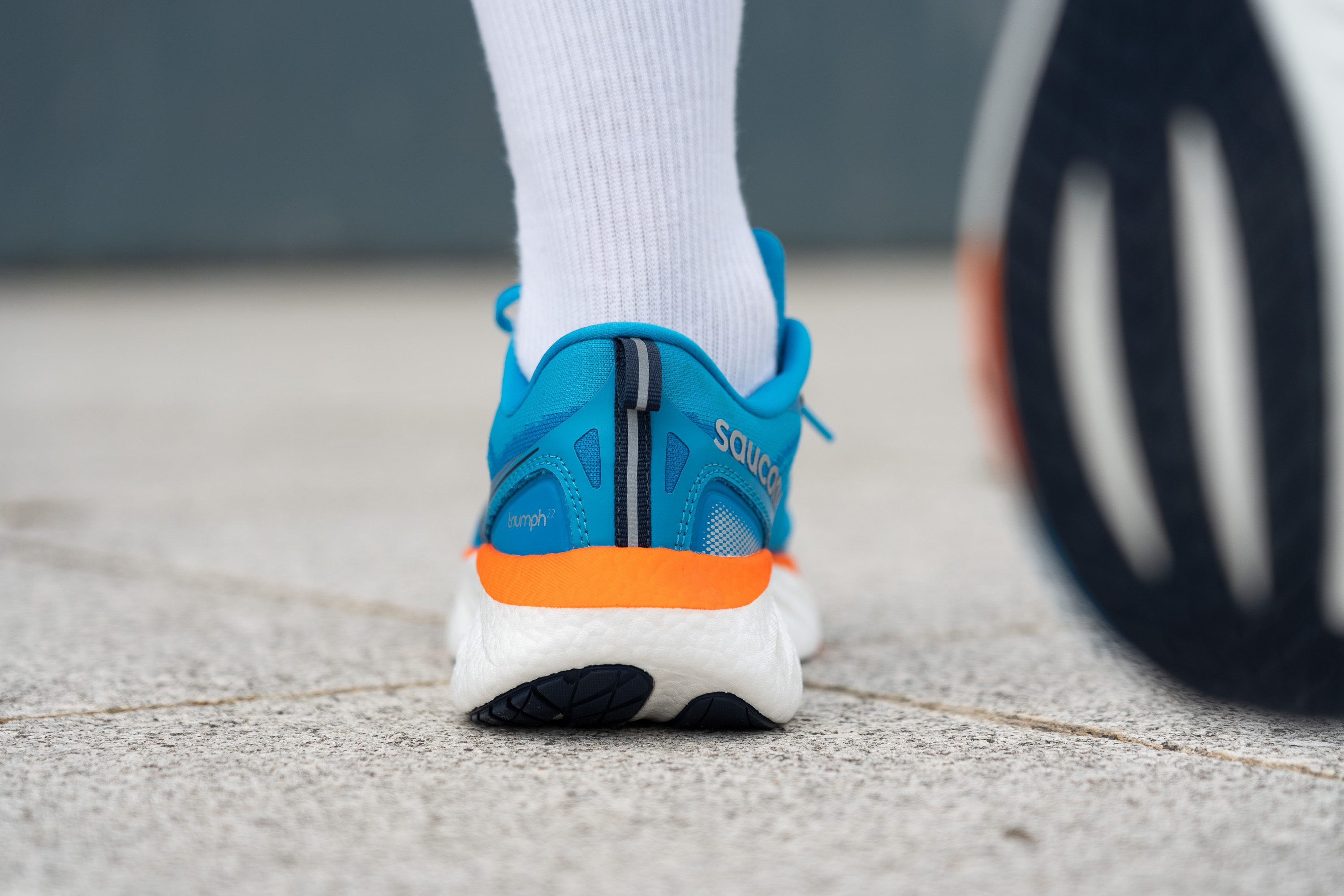
This feature ensures that cars and motorbikes are aware of our presence in low-light conditions.
| Triumph 22 | Yes |
Tongue padding
The Triumph series has always been about comfort for Saucony, typically featuring a plush tongue.
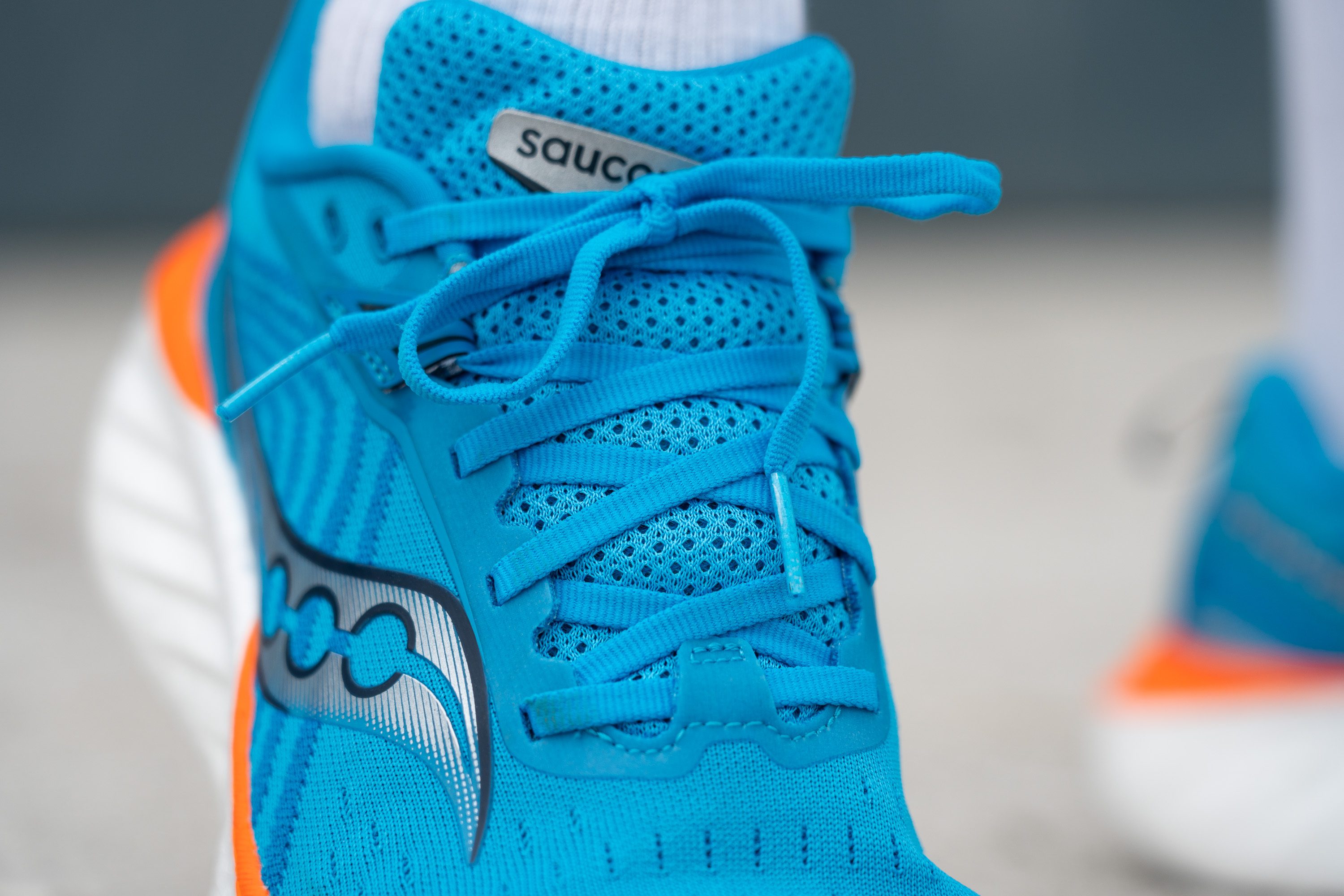
In the 22nd edition, we discovered 8.5 mm of padding, achieved through the use of two foam layers, creating an exceptionally comfortable instep feel. This design is ideal for long runs, providing outstanding comfort and support.
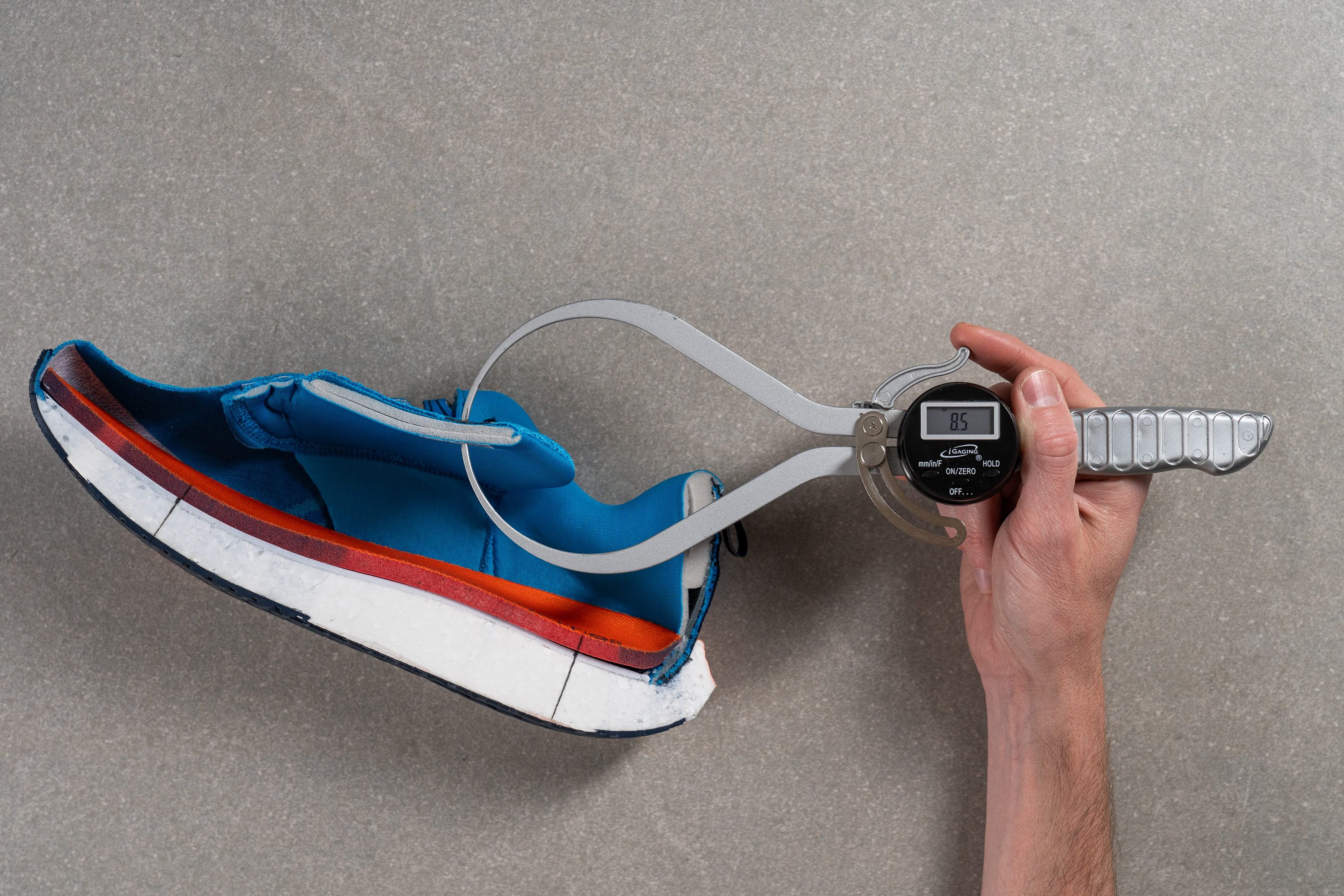
| Triumph 22 | 8.5 mm |
| Average | 5.7 mm |
Tongue: gusset type
We were thrilled to discover a semi-gusseted tongue in the Triumph 22.
This choice is perfect for us, as a fully-gusseted tongue would feel overly bulky with so much padding in the upper. On the other hand, a non-gusseted tongue in such a premium shoe would be disappointing.
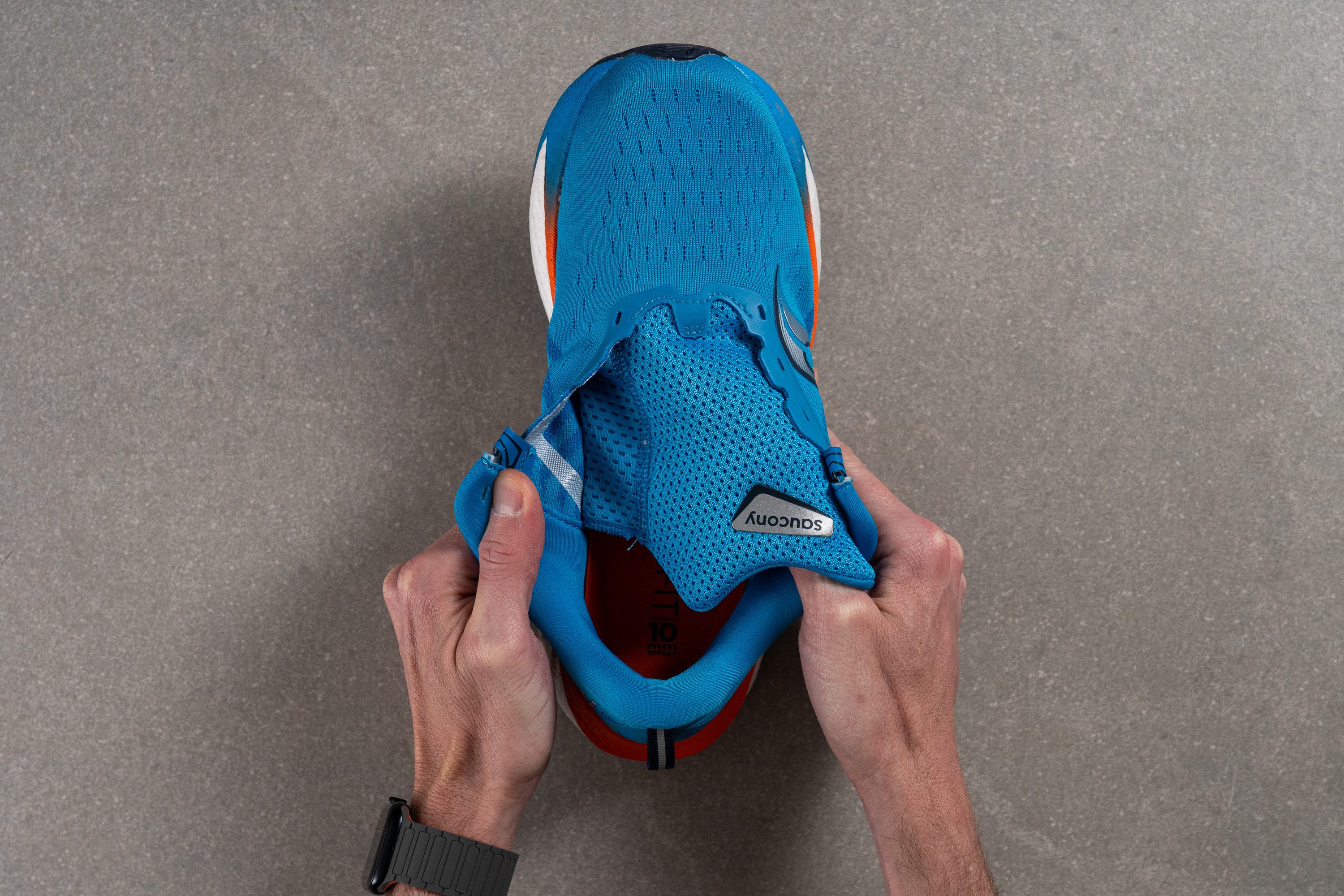
| Triumph 22 | Both sides (semi) |
Heel tab
The heel includes a vertical finger-loop heel tab, which is a clear upgrade from the one we found in the Triumph 21.
| Triumph 22 | Finger loop |

